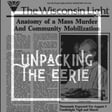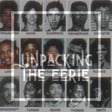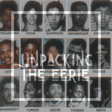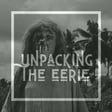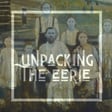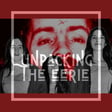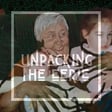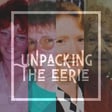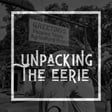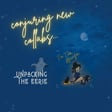Introduction to Anne Hamilton Byrne and The Family cult
00:00:05
Speaker
The family, the Australian doomsday cult she founded in the 1960s, she claimed to be Jesus reborn as a woman.
00:00:12
Speaker
She said, this is feminism.
Podcast Introduction and Content Warning
00:00:26
Speaker
And I'm Shayna, and you're listening to Unpacking the Eerie.
00:00:30
Speaker
A podcast that explores the intersections of our dark and morbid curiosities through a social justice lens.
00:00:44
Speaker
Before we get started, we want to offer our usual content warning.
00:00:48
Speaker
This episode includes conversations about sexual assault, suicide, child abuse, and ritual abuse.
00:01:03
Speaker
We're back with part three.
00:01:07
Speaker
Of a psychedelic nightmare.
00:01:10
Speaker
But this will be our first part where we're not talking about MKUltra.
00:01:14
Speaker
Yes, but it is related.
Podcast Merchandise Announcement
00:01:19
Speaker
Before we jump in, we wanted to let you know that merch is available on our website.
00:01:27
Speaker
We have like a heat reactive mug.
00:01:35
Speaker
And then we're gonna drop some more.
00:01:37
Speaker
So stay tuned for that.
00:01:40
Speaker
And then if you are a Patreon patron, you get a discount.
00:01:44
Speaker
And that's listed on Patreon.
00:01:49
Speaker
Well, I guess we should jump in.
00:01:51
Speaker
Let's get started.
00:01:53
Speaker
With this wild, it's wild as fuck.
00:01:55
Speaker
There's a lot of information, too, so we'll see.
00:01:57
Speaker
Should rename our podcast Wild As Fuck.
00:02:02
Speaker
We do say that a lot.
00:02:05
Speaker
Maybe we could put that on merch.
00:02:07
Speaker
That's a good idea.
00:02:10
Speaker
Yeah, would you buy that?
00:02:11
Speaker
Yeah, let us know.
00:02:12
Speaker
I have no idea what people would buy.
00:02:18
Speaker
I did just buy a Stranger Things hoodie.
00:02:22
Speaker
Is it just Stranger Things?
00:02:25
Speaker
This is obviously not like marketing for them.
00:02:27
Speaker
But there's this like artist who did really cool cover art for every single episode of season four.
00:02:36
Speaker
And they have each of it on hoodie.
00:02:39
Speaker
So I got the cover art for.
00:02:42
Speaker
the last episode of season four butcher billy is the the artist's name and you can buy it on the netflix's website imagine butcher billy's stoked he got to do that i know but all of the all of them are actually pretty cool so and they have t-shirts and shit we should get an artist to like do stuff like this for our podcast
00:03:06
Speaker
So if you're an artist or illustrator or media something and want to make cool cover art for our podcast, let us know.
00:03:20
Speaker
What are we talking about today?
Origins and Beliefs of The Family Cult
00:03:24
Speaker
We're talking about a cult that was active in the 60s and overlaps with the MKUltra timeline and very eerily kind of mirrors what they were doing.
00:03:37
Speaker
And you'll see all the connections as we go along.
00:03:41
Speaker
But as an overview, this cult is largely known as The Family, but its original name was the Great White Brotherhood of Initiates and Masters, which sounds like the KKK to me.
00:03:55
Speaker
It was founded in 1963.
00:03:58
Speaker
And I would say it's, like, white supremacy meets doomsday meets second coming of Christ meets cultural appropriation of Hinduism and Buddhism.
00:04:08
Speaker
And, like, narcissistic abuse, which I think is inherent in the cults often.
00:04:14
Speaker
And it was... See Jim Jones episode.
00:04:18
Speaker
Honestly, the parallels, uncanny.
00:04:20
Speaker
They're really not creative.
00:04:23
Speaker
And we're going back to Australia...
00:04:26
Speaker
wild ass australia wild as fuck australia and this little place is tucked away in the countryside outside of melbourne melbourne melbourne okay this is so side note but i saw a tiktok that was like if you say rnr it sounds like oh no in an australian accent rnr oh my god
00:04:59
Speaker
Actually, I have a side tangent.
00:05:01
Speaker
So when I was in high school, I used to go on Omegle a lot and Chatroulette, like a lot.
00:05:07
Speaker
I used to go on Omegle more because I think Chatroulette was a little scary for me.
00:05:12
Speaker
Because there was a lot of dicks.
00:05:16
Speaker
I would sometimes go with my friends because then at least you have a buddy.
00:05:19
Speaker
But Omegle, I would go by myself.
00:05:22
Speaker
Yeah, I think, I don't know, my senior year of high school, man, I was just, like, really over my current social options.
00:05:31
Speaker
And so I wanted to, I went on to the internet.
00:05:38
Speaker
For the Gen Zs, that's what we used to say.
00:05:41
Speaker
And it's age, sex, location.
00:05:45
Speaker
Which I always lied about.
00:05:46
Speaker
I just made up something.
00:05:49
Speaker
But yeah, I would be on there kind of late at night because I would stay up really late.
00:05:55
Speaker
And during that time, it was like a reasonable time for Australians to be on.
00:05:59
Speaker
So I met a lot of Australians.
00:06:02
Speaker
And I don't know if this is universal, but I constantly heard that they really enjoyed American accents, which surprised and shocked me because I think American accents are ugly.
00:06:15
Speaker
And people think we sound dumb.
00:06:17
Speaker
Well, the Australians, I guess, don't.
00:06:18
Speaker
I guess they don't.
00:06:21
Speaker
I enjoy an Australian accent.
00:06:26
Speaker
So this countryside was situated around Lake Yildon.
00:06:32
Speaker
And the internet notes that this is the most disturbing cult in Australia's history.
00:06:36
Speaker
So Catherine, the most disturbing... Cannibal?
00:06:41
Speaker
Well, she was like the first woman to be sentenced to life in prison.
00:06:44
Speaker
Oh, yeah, yeah, yeah.
00:06:45
Speaker
So she's like the most disturbing... Yeah.
00:06:48
Speaker
Female killer, I guess.
00:06:50
Speaker
That they know of.
00:06:52
Speaker
So now we have another wild-ass woman.
00:06:57
Speaker
Yeah, noted as the most disturbing cult in Australia's history.
00:07:00
Speaker
There were over 500 people, including over 28 children, who were collected via
Anne Hamilton Byrne's Background and Identity Transformation
00:07:05
Speaker
bogus adoptions, which we'll get to later.
00:07:08
Speaker
And a lot of this cult circled around the use of LSD to control their followers, which is where MKUltra connects.
00:07:17
Speaker
Before we, like, talk about the cult itself, I think we have to talk about the person who started the cult, Anne Hamilton Byrne.
00:07:26
Speaker
This article from The Guardian, written by Abigail Hayworth, opens with, Anne Hamilton Byrne wore pearls and Chanel perfume.
00:07:34
Speaker
She played the harp and sang soprano.
00:07:36
Speaker
She had blonde hair styled in waves that caught the light.
00:07:40
Speaker
As leader of the family, the Australian doomsday cult she founded in the 1960s, she claimed to be Jesus reborn as a woman.
00:07:47
Speaker
She said, this is feminism.
00:07:54
Speaker
Much of her power, say her former followers, lay in her gray-blue eyes.
00:08:01
Speaker
So Fran Parker, who is an ex-acolyte, says, in ancient times we hear about enchantresses who can enslave people with one glance...
00:08:09
Speaker
She had eyes that looked through your soul.
00:08:12
Speaker
Anne Hamilton Burns' ultimate tool of entrapment, however, was something she pinpointed herself in a rare radio interview after the cult's devastating abuses were exposed.
00:08:23
Speaker
She said, it was love.
00:08:26
Speaker
And you'll learn, it was not just love.
00:08:33
Speaker
One of the survivors was quoted in this article too.
00:08:35
Speaker
Her son was like one of the children who were really like the prime recipients of this abuse and said Anne wasn't giving love.
00:08:43
Speaker
She was offering it and then taking it back.
00:08:45
Speaker
She broke people's spirit, which she, yeah.
00:08:48
Speaker
Anne is one of the few known female cult leaders in the world.
00:08:52
Speaker
I don't know how real that is now.
00:08:54
Speaker
Like I definitely see some new age weird shit popping up all across the United States.
00:08:58
Speaker
A lot of which are like,
00:09:02
Speaker
ran by women, usually white women who, like, think they're the great mother or whatever.
00:09:07
Speaker
There's a weird, like, narcissistic, nurturing savior complex that I think they all have.
00:09:13
Speaker
But, you know, maybe we can get to that another time.
00:09:16
Speaker
So the cult's motto was unseen, unknown, and unheard, which kind of sounds like the see no evil.
00:09:22
Speaker
Yeah, yeah, yeah, yeah.
00:09:24
Speaker
And it operated in secrecy for over 20 years.
00:09:30
Speaker
They really got away with a lot.
00:09:32
Speaker
Just like other episodes where people are really just, like, fucking horrible.
00:09:36
Speaker
We're like, what's going on there?
00:09:39
Speaker
Where does this come from?
00:09:40
Speaker
Yeah, what happened to you?
00:09:42
Speaker
And I want to preface by saying, again, a backstory gives us insight and context, and it does not excuse abusive behavior, and it does not cause abusive behavior.
00:09:50
Speaker
Plenty of people experience traumatic childhoods and do not come out and be like this.
00:09:57
Speaker
I just feel like it's worth reiterating that's not what we're saying when we go back and talk about, like, what the fuck happened to this person.
00:10:04
Speaker
Because multiple things can be true at the same time.
00:10:07
Speaker
Anyways, so Anne Hamilton Byrne was actually born Evelyn Grace Victoria Edward in Sale, Australia on December 30th, 1921.
00:10:16
Speaker
And Sale, Australia is this, like, tiny farm town.
00:10:18
Speaker
She was the eldest of seven children, and her family was very poor.
00:10:23
Speaker
Her dad lost his first wife while he was fighting in World War I.
00:10:27
Speaker
And then married her mom, so I'm feeling like lots of trauma and grief there with the dad, who ends up not being present.
00:10:35
Speaker
Her mom, Florence Hoyle, was also not present.
00:10:41
Speaker
She was known around town as the woman who claimed to be a medium, who could communicate with the dead.
00:10:46
Speaker
And one time she set her hair on fire in the street, and so she was largely known as the woman who set her hair on fire in the street.
00:10:57
Speaker
Her dad abandoned the family after Evelyn was born, so she didn't really know her dad.
00:11:02
Speaker
So she lived with her mom, who was clearly not...
00:11:08
Speaker
She would later be diagnosed with schizophrenia.
00:11:12
Speaker
And her, she was first hospitalized in 1941 when Evelyn was 20 and then spent the next 27 years of her life in psychiatric hospitals.
00:11:19
Speaker
So her mom really never got better, was never present as a mother.
00:11:22
Speaker
The dad was in and out of her lives.
00:11:24
Speaker
He would routinely move from place to place, changing his identity and claiming he had no children.
00:11:29
Speaker
So he really didn't want to.
00:11:31
Speaker
There's seven of them.
00:11:32
Speaker
Like he really was like, I'm out.
00:11:34
Speaker
I think in one of the podcasts I listened to it said that some of her siblings also had kind of psychotic illnesses too.
00:11:44
Speaker
And that was part of the reason that the dad also was like, oh, I don't want to deal with this.
00:11:52
Speaker
Yeah, and I don't know how many of these siblings were his also.
00:11:56
Speaker
Right, right, right.
00:11:58
Speaker
So Evelyn spent a great deal of her younger years in the local orphanage.
00:12:02
Speaker
The only information they had about her in her elementary school years was that she was enrolled in the Sunshine Primary Program in 1929.
00:12:09
Speaker
Everything else is kind of like, we don't really know, especially since she didn't want to claim that identity, right?
00:12:16
Speaker
Like, she did a lot to throw her history away.
00:12:21
Speaker
So fast forward to her adult life.
00:12:24
Speaker
In 1941, she married a farmer named Lionel Harris.
00:12:28
Speaker
They have a daughter, Judith, in 1943, which I was watching this documentary and they say she had a kid and then never came back to it.
00:12:34
Speaker
So I have no idea what the fuck happened to this kid.
00:12:37
Speaker
He leaves the Air Force early because he's concerned about her mental health.
00:12:42
Speaker
The doctors say that she was very abnormal and strange towards her child, and they diagnosed her as depressed and noted that she was neglectful of her kid.
00:12:53
Speaker
Well, we can go back to Catherine's episode where we talk about postpartum.
00:13:00
Speaker
after the war they connected with an adoption agency because she wanted to expand the family and then on january 8th 1955 lionel was killed in a car crash so they lost the chance to adopt in 1955 a single woman could not adopt a child so like all of these like hopes and dreams of like creating this family that she never had not actualized after this she like
00:13:24
Speaker
Gets a ton of cosmetic surgery, and she resurfaced with her new name, Anne Hamilton.
00:13:30
Speaker
Like, she dyed her hair blonde, she changed her facial features, she looks very different.
00:13:34
Speaker
In the... What is that, that podcast?
00:13:39
Speaker
They were talking about, like, her identity crisis and how, like...
00:13:43
Speaker
You know, research shows that parental role models are key to child development and creating a sense of self.
00:13:49
Speaker
So redefining herself was an attempt to develop her own sense of identity that was underdeveloped during her formative years because she had no models to be like, hmm.
00:13:59
Speaker
Am I in relation to my parents?
00:14:01
Speaker
My parents are not here.
00:14:02
Speaker
My parents are unwell and my parents don't want me.
00:14:05
Speaker
And there's like a key identity crisis that happens, particularly with young people who know they've been left.
00:14:13
Speaker
to her or to children, it feels intentional.
00:14:16
Speaker
Like they left me.
00:14:17
Speaker
Um, so this like complex of, uh, not being able to form an identity outside of being like abandoned, very challenging if you don't have other supports.
00:14:29
Speaker
And so she becomes very fixated on finding a family, which you kind of see in her, like, going to the adoption agency, even though she had a really hard time connecting with her own child.
00:14:42
Speaker
And then, you know, I don't know if she had some type of complex about, like, oh, well, you know, I was in the orphanage, and so I'm going to adopt someone who doesn't have parents.
00:14:52
Speaker
Right, right, right.
00:14:53
Speaker
And I'm going to undo.
00:14:56
Speaker
I imagine that this only exacerbated her abandonment complex.
00:14:59
Speaker
Lionel leaving and her not being able to fulfill her family, whatever, reinforces this feeling of like, okay, well, people will always leave me either by choice or by death.
00:15:09
Speaker
And I think it's common that people seek out ways to feel in control when that kind of loss happens.
00:15:14
Speaker
She just ended up doing it in a really horrible way.
00:15:19
Speaker
With that, I think I'm going to pass it to you because right after the surgeries and stuff happened, this is when she gets into her foray with spirituality and yoga.
Cultural Appropriation and Commercialization of Yoga
00:15:33
Speaker
Interestingly, because this ties back to her mom, one of her inspirations was...
00:15:37
Speaker
Helena Blavatsky, who was a Russian-born medium who co-founded the Theosophical Society.
00:15:44
Speaker
And she actually... She was one of the people that kind of brought Eastern philosophy and Eastern forms of thought to the West.
00:15:54
Speaker
She was born to an aristocratic family in the 1800s.
00:15:59
Speaker
And some say that she visited spiritual masters in Tibet...
00:16:04
Speaker
Other people say that she's like gone to parts of the Middle East and Egypt.
00:16:08
Speaker
She basically is one of the people who's like instrumental in like European occulticism and like mysticism.
00:16:15
Speaker
She described theosophy as a synthesis of science, religion, and philosophy.
00:16:20
Speaker
And, you know, was one of the people, like I said, who's instrumental in bringing Hinduism and Buddhism philosophies to the West.
00:16:27
Speaker
So it kind of makes sense that she was an inspiration to Anne.
00:16:32
Speaker
So in Anne's mid-30s, which was in the late 50s after her husband had just died, she started to practice yoga.
00:16:41
Speaker
And in the early 60s, she started teaching yoga to middle-aged women in Melbourne.
00:16:48
Speaker
This was at a time that spiritualism and kind of these kind of practices was gaining popularity in a lot of different places in the world, especially in the West.
00:16:57
Speaker
I just wanted to take some time to talk about yoga and how it's been co-opted by like white folks and is this like largely commercialized thing when it's very disconnected from what the roots and origins of yoga are.
00:17:11
Speaker
So I found this article written by someone named Sheena Sood.
00:17:20
Speaker
at Temple University and she is Punjabi and a lot of her I read a couple of articles that she wrote and it's about like
00:17:28
Speaker
decolonizing yoga and she talks about her personal experience with it a lot so what does yoga actually mean it means the union of the mind body soul and spirit and I think a lot of people think of yoga as this like exercise like practice when that's really just a really small part of it there's four dimensions to yoga there's karma yoga which is service there's jhana yoga which is philosophy there's bhakti yoga which is devotion and
00:17:58
Speaker
And what's emphasized in the West is Raja Yoga or Asana, which is the postural practice, which is just one of the four dimensions of yoga.
00:18:08
Speaker
So Sheena says, although I believe yoga philosophy, when rooted in a diversity of indigenous philosophies, is grounded in living a life in tune with all beings' liberation,
00:18:20
Speaker
Yoga's core principles are misappropriated and commodified for agendas that exacerbate oppression.
00:18:26
Speaker
Hindus and Western yogis perpetuate the violence of yoga through bypassing the moral tenets for a disembodied, posture-heavy practice that presents a surface-level understanding of humanity's interconnectedness in suffering and liberation.
00:18:40
Speaker
So what was cool about the stuff that she talked about is that, like, I think when we read a lot about, like, yoga being culturally appropriated by white folks, there is this, like, focus on, like, well, yoga comes from ancient India.
00:18:56
Speaker
And so, like, we're appropriating this practice from ancient India.
00:19:00
Speaker
But Sheena says...
00:19:02
Speaker
Was yoga born to a static monolithic Hindu culture?
00:19:06
Speaker
Or was it born as a diversity of indigenous and ancestral cultures that inhabited the South Asian region?
00:19:14
Speaker
On a related note, to what degree did ancient African civilizations influence the evolution of yoga's culture?
00:19:19
Speaker
She talks about how her yoga teacher talked about...
00:19:24
Speaker
how the philosophical dimensions of yoga cannot be credited to any kind of orthodox religion and that it's rooted in indigenous belief systems and rituals and that a diversity of indigenous South Asian cultures actually contributed to what's advertised as yoga today.
00:19:40
Speaker
And it doesn't come from like Hinduism and it doesn't come from like Hindu culture.
00:19:46
Speaker
appropriated even by like Hindus who are saying like yoga is ours when actually it comes from an amalgamation of tons of indigenous South Asian cultures and the reason why it's been kind of like collapsed under this one umbrella is because of years and years of colonization that have really made
00:20:07
Speaker
South Asia into this like one monolith when it really was never that before colonization.
00:20:14
Speaker
You know, her yoga teacher confirmed that because of migration, indigenous knowledge systems worldwide have always influenced each other's spiritual philosophies, which is why you like you notice similarities across like spiritual beliefs across indigenous cultures all over the world.
00:20:33
Speaker
So today yoga has been commodified in a way that is like trendy, self-serving, very fitness focused and also like elitist and expensive.
00:20:43
Speaker
I have such a hard time going to yoga classes here because they're so appropriative in ways that there's Hindu god pictures and Aum symbols and yoga teachers pronouncing Sanskrit words and mantras wrong and using puns with them, for example.
00:21:06
Speaker
Namaste in bed all day.
00:21:08
Speaker
Namaste means like, it's like a greeting in Hindi of like, I bow to you.
00:21:15
Speaker
You say it as like a hello and a goodbye.
00:21:17
Speaker
And it's not actually like related to yoga.
00:21:19
Speaker
It's probably just like something that white yoga teachers heard when they like maybe went to India for like teacher training and then just brought it over because it sounds exotic.
00:21:30
Speaker
I was, do you know, Susanna...
00:21:34
Speaker
Barkataki you've probably seen some of her stuff on Instagram.
00:21:37
Speaker
She's a yoga teacher who
00:21:41
Speaker
like post a lot about like decolonizing yoga.
00:21:44
Speaker
And I read something that she wrote on her website that's specifically a letter to white people who teach yoga.
00:21:49
Speaker
And it's asking them like, why is it that you've decided to like make this your profession?
00:21:55
Speaker
And a lot of people will say, well, like, oh, well, you know, when I practiced it, it really benefited me.
00:21:59
Speaker
But she puts the question just or she makes a statement just because you've benefited from something doesn't make it yours to do whatever you want with it.
00:22:06
Speaker
Which I think is what links to a lot of culturally appropriative stuff where people are like, oh wow, especially white people are like, wow, this really benefited me.
00:22:14
Speaker
We can see that this is what happened with Anne too.
00:22:17
Speaker
So I'm going to now make it my own and capitalize on it and profit from it.
00:22:23
Speaker
You know, this really reminds me, there's this temple in San Francisco that I used to go to to meditate.
00:22:31
Speaker
Like, my friend, I think I was, like, 19.
00:22:33
Speaker
I had just moved there.
00:22:34
Speaker
So I was, like, trying to find something to connect spiritually to do on a regular basis.
00:22:40
Speaker
I mean, generally speaking, it was very nice.
00:22:42
Speaker
They always offered, like, free tea and whatever.
00:22:45
Speaker
But it was really weird because, like, you know, they would go through these meditation sessions and it was consistently always a white leader, consistently full of white people wearing, like...
00:22:57
Speaker
you know, these garments.
00:23:00
Speaker
And they, like, the guy, it was a certain, like, it was very specific to this one dude and, like, his way of, like, Buddhist teachings.
00:23:09
Speaker
And there's, like, a lot of history behind, like, he wanted to have this spread across, like,
00:23:13
Speaker
the world and so a lot of the tea a lot of the teachings went to white people because i think he knew that they are people who could spread it around right right and so now i'm like looking at this place that i went to weekly i think i was consistently the only asian person in the room and they're just like out here espousing buddhism and a lot of the times like
00:23:36
Speaker
the stories like I remember this one white dude was like you know when I was younger I just valued the wrong things you know I just valued my car and my material possessions and all of this stuff and I was going to my corporate job and I just felt so empty and
00:23:55
Speaker
And I found this practice and it was really illuminating for me.
00:24:01
Speaker
And I realized it's like not all about material things.
00:24:04
Speaker
And like we need to just relinquish this idea that material things bring us happiness.
00:24:09
Speaker
And I'm just like, what in the white world is this?
00:24:16
Speaker
It's so superficial.
00:24:18
Speaker
And I'm just like, wow, did you just like...
00:24:20
Speaker
You feel enlightened now that you realize that material things don't make you happy.
00:24:27
Speaker
So that links really well to, like, you know, I think a lot of people might have seen starting in 2020 that a lot of, like, yoga teachers and people in wellness, and I'll talk more about this in the next episode, but I'll just, like, surface level say some stuff about it now, have been tied to, like, QAnon and some, like, really intense far-right conspiracy theories, right?
00:24:47
Speaker
You know, and I, like, found this article that was written by Anusha Vijaykumar, and it's about white supremacy
White Supremacy in Modern Yoga Practices
00:24:55
Speaker
And she talks about how, like, the journey of a person on the path of yoga is to recognize their own divine nature and in turn also recognize and honor the divine nature of others.
00:25:05
Speaker
And these yoga teachers have popularized the statement, like, we are all one, but it becomes like this, like, empty slogan that's part of spiritual bypassing.
00:25:14
Speaker
which is causing harm and dismissing discrimination of marginalized and oppressed people.
00:25:20
Speaker
When that's the concepts of dharma, karma, law of action, cause and effects, service, these kind of things are lost on members of the yoga community because they don't understand the true spirit of yoga, which is love and compassion, but in an active way and not in this passive, like, oh, all lives matter, like spiritual bypassing.
00:25:43
Speaker
that a lot of white folks do.
00:25:45
Speaker
Interestingly, in this article, she talks about this meditation teacher and sound healer from Orange County.
00:25:55
Speaker
Who was prominent in the All Lives Matter.
00:25:59
Speaker
I don't even want to call it a movement because it was not.
00:26:02
Speaker
And he was one of the people that organized protests against the COVID lockdowns.
00:26:09
Speaker
Those... Oh my gosh, my hometown was a hotbed for those protests.
00:26:13
Speaker
He told his followers to share videos of themselves burning masks.
00:26:19
Speaker
Imagine wanting to be oppressed so badly.
00:26:22
Speaker
Anyways, so going back to Sheena, she lives in Philly, and she created this group, Yogini Sisters for Liberation, and it's a youth-focused yoga group.
00:26:35
Speaker
journey into Afro-Asian mythology and the workshop allowed nine young women of color to see themselves and their ancestors in a spiritual practice often marketed to a different audience.
00:26:47
Speaker
That same year, a collective of social justice yogis and Sheena offered an eight-month yoga fundraiser series called Free Your Mind, Free Mumia, Free Them All, and it was designed to cultivate awareness about the interconnectedness of all beings, especially
00:27:03
Speaker
political prisoners and their struggle for liberation.
00:27:06
Speaker
Yeah, she wrote a different article that was about like similar topic towards a critical embodiment of decolonizing yoga.
00:27:14
Speaker
And she had a checklist for like, she started doing these decolonizing yoga workshops at a yoga studio for teacher training programs.
00:27:24
Speaker
And she created this like checklist of principles.
00:27:28
Speaker
And she doesn't say that it's like, you know,
00:27:30
Speaker
that these are all of the principles, but there are some that she came up with that are about the core of yoga, which is finding liberation within self and within community.
00:27:42
Speaker
And she talks about decolonized yoga pays homage to the land upon which one is practicing and to the indigenous caretakers who have been and are being murdered and displaced by colonial structures.
00:27:54
Speaker
It examines yoga's ancestral lineage through a critical lens.
00:27:57
Speaker
It honors the indigenous and heterogeneous cultures around the globe, including in ancient African civilizations that have contributed to yoga's evolution and preservation.
00:28:07
Speaker
It recognizes yoga as a broadly
00:28:09
Speaker
originated by indigenous South Asian cultures, but refuses to essentialize its history through ethno-nationalistic frameworks.
00:28:17
Speaker
It critically engages with classical Indian and Hindu philosophical texts instead of accepting them as inherently just and liberatory.
00:28:26
Speaker
It disrupts dominant cultural narratives of yoga via colonial, religious, ethno-nationalist, and Brahminical casteist power structures.
00:28:34
Speaker
It reckons with embedded caste, Islamophobic, and ethno-nationalist ideologies and violence in yoga spaces and resists the tendency to use yoga as a tool of spiritual bypassing.
00:28:44
Speaker
It disputes whitewashed explanations about and appropriations of yoga culture history.
00:28:50
Speaker
It understands the experiences of poverty, suffering, and oppression in the world to be generated by structures of settler colonialism, racial capitalism, casteism, neocolonialism,
00:29:01
Speaker
And imperialism and contemplates how to eliminate suffering in the world by that aim to dismantle exploitative economic and social systems honors the interconnectedness of humanity, all living beings and nature on and off the map.
00:29:17
Speaker
recognizes and names the harm perpetuated in the name of Sanskrit across time, and critically considers whether to use language, Sanskrit chants, clothing, and rituals that are not part of a cultural lineage that one's ancestors are rooted in, disrupts the competitive and commodified packaging of yoga, challenges how yoga is weaponized in modern institutions,
00:29:39
Speaker
For example, yoga programs for cops and militaries and in popular culture uses yoga to actively cultivate compassion, loving kindness, balance and joy for self and others works towards justice and liberation, centers marginal bodies, voices and groups, particularly BIPOC folks in accessing healing.
00:29:58
Speaker
and the healer within, shares yoga in democratic and non-hierarchical ways, works towards liberation, evolution, and transformation internally and externally within self and society, recognizes yoga and our body, breath, and spirit as a gift from the universe greater than any nation, religion, ethnic, or social group,
00:30:16
Speaker
and recognizes nature, the core elements of earth, water, air, and fire, and Mother Earth as the greatest all-time guru of spiritual liberation.
00:30:25
Speaker
So connecting back to what you were saying about this meditation school that you were going to, and this dude's trying to just spread his word, her yoga teacher talks specifically about
00:30:36
Speaker
leaders who seem to be like passing a message of like this is my message and it's right kind of similar to ann and he he taught that yoga is not about spiritual manipulation and giving a leader control over your path it's about finding liberation within yourself because all humans have a right to you know free will and self-determination so that's pretty cool you know and i enjoyed reading this um article of hers i also wanted to highlight um
00:31:06
Speaker
Since we're talking about just like a little bit about like mysticism, I wanted to highlight Juliet Diaz's book, The Altar Within, where she talks a lot about how to practice spirituality in a way.
00:31:20
Speaker
that is anti-oppressive and doesn't spiritually bypass.
00:31:27
Speaker
And so, yeah, that's my little tangent about yoga and the commodification and cultural appropriation of yoga.
00:31:38
Speaker
So coming back to Anne in the 60s, she's teaching yoga to these middle-aged women in Melbourne.
00:31:46
Speaker
It was at a time that divorce wasn't really that accepted, but she used to encourage these women to leave her husband's and join her.
00:31:55
Speaker
She also apparently had a lot of gay male followers who she taught yoga to, and she offered them refuge from Australia's laws against homosexuality at the time.
Manipulation and Formation of the Cult
00:32:05
Speaker
So like I said earlier, spiritualism was gaining popularity in this time, and it was also gaining popularity in scientific circles.
00:32:11
Speaker
And there was this doctor named Dr. Rainer Johnson who was like,
00:32:15
Speaker
really curious about exploring this.
00:32:19
Speaker
And he started experimenting with LSD and you can tell us a little bit more about that and how he connects to Anne.
00:32:29
Speaker
So Dr. Rainer Johnson.
00:32:33
Speaker
It's 1962 and Anne is like very zoned in on Dr. Rainer Johnson.
00:32:40
Speaker
I'm just going to go over a little bit.
00:32:43
Speaker
share what Wiki has to say about him very briefly.
00:32:47
Speaker
So Rainer Carey Johnson was born April 5th, 1901.
00:32:52
Speaker
He was an English-born Australian.
00:32:54
Speaker
He called himself a parapsychologist, a physicist, and an author.
00:32:57
Speaker
He earned his master's at the University of Oxford and in 1922 got a PhD in physics at the University of London.
00:33:06
Speaker
And then he was hired at Queen's University to lecture on natural philosophy.
00:33:12
Speaker
And then he had a bunch of published works and whatever.
00:33:15
Speaker
Just sharing this for context, this man was considered a dignified scholar, right?
00:33:23
Speaker
Queen's College was so excited to have him there.
00:33:29
Speaker
And then it's during this time where he was teaching, where he really got into mysticism and psychic research.
00:33:37
Speaker
He wrote several books on it.
00:33:40
Speaker
It says that his beliefs and writings eventually created concern within the Methodist church, which Queen's College was a very religious place.
00:33:48
Speaker
So it's interesting to see how the two lines of white spiritual superiority are at odds here.
00:33:59
Speaker
They're like, I'm concerned about you.
00:34:01
Speaker
And I'm just like, okay, well...
00:34:06
Speaker
You're both concerning in different ways.
00:34:09
Speaker
Both areas have been violent and used spirituality as a excuse or whatever.
00:34:18
Speaker
So that's a little bit about Rainer.
00:34:21
Speaker
So Anne would routinely come to this school.
00:34:24
Speaker
She would do weird ritualistic burning shit in front of the school.
00:34:28
Speaker
I think she just wanted to get attention.
00:34:33
Speaker
She had friends at the university, so they kept... She really embedded herself into high places.
00:34:40
Speaker
She had access to...
00:34:42
Speaker
An outrageous amount of, like, social workers, doctors, lawyers, scholars.
00:34:50
Speaker
Like, she was, she intentionally surrounded herself with very powerful people.
00:34:55
Speaker
And everyone says she's very charismatic and she just had her way.
00:34:59
Speaker
And I just feel like that gives her a lot of credit.
00:35:01
Speaker
I think she was just a white woman who was confident about what she was doing.
00:35:08
Speaker
The cults podcast.
00:35:11
Speaker
I take the cults podcast with a grain of salt because I've routinely listened to these like podcast episodes and found like very conflicting information.
00:35:20
Speaker
I'm just like, where'd you get this information?
00:35:22
Speaker
But on the cults podcast, they said that not only did she have friends at the university keep tabs on him, that she slept with his gardener.
00:35:30
Speaker
And was trying to get info from his gardener.
00:35:31
Speaker
How does, do they find this info?
00:35:36
Speaker
But she used, she like collected all this info to get him and others to believe she was clairvoyant.
00:35:43
Speaker
So Anne came to his home on a day that he called a day of destiny in his diary.
00:35:48
Speaker
He has a diary that he like outlines all of this information in.
00:35:54
Speaker
And I guess she says, I don't think you know me, but I know you well.
00:35:57
Speaker
And she said that she knew him and she knew his wife.
00:36:01
Speaker
She knew that they were both going to India and that his wife was going to get sick there.
00:36:06
Speaker
And it just so happens that his wife, him and his wife did go and his wife did get sick with dysentery.
00:36:14
Speaker
And that was all he needed.
00:36:16
Speaker
He was like, this woman knows so much about me.
00:36:18
Speaker
And then it also fed his ego.
00:36:20
Speaker
He felt spiritually chosen, too, by her.
00:36:25
Speaker
I have this quote where after he did LSD, he wrote in his diary about Anne, her face became divinely beautiful with sublime authority.
00:36:36
Speaker
She was unquestionably the wisest, serenest, and most gracious and generous solitaire.
00:36:49
Speaker
Rainer, you need to relax.
00:36:53
Speaker
Can you imagine what this did to her fucking ego?
00:36:56
Speaker
She ate that shit up.
00:36:57
Speaker
She was like, yes.
00:37:02
Speaker
And I think, like, there's also, like, if she's the chosen one and she's chosen me, then I'm by proxy the chosen one, too.
00:37:12
Speaker
So they join forces and this is where the birthplace of the Great White Brotherhood starts.
00:37:20
Speaker
So I looked into the Great White Brotherhood and they're like, its origin stories are way before this.
00:37:27
Speaker
So they're like, not the founders of the Great White Brotherhood, but they're pulling from like a history of, of this.
00:37:39
Speaker
says that it's a belief system akin to theosophy and New Age.
00:37:45
Speaker
Are said to be perfected beings of great power who spread spiritual teachings through selected humans.
00:37:51
Speaker
The members of the Brotherhood may be known as the masters of the ancient wisdom, the sended masters, the church invisible, or simply as the hierarchy.
00:38:02
Speaker
And I'm just like, the way this language is so colonial.
00:38:09
Speaker
The first person to talk about them in the West was Helena Petrovna Blavatsky.
00:38:13
Speaker
Oh, that's the person that I was talking about.
00:38:17
Speaker
So there's the connection.
00:38:18
Speaker
That makes sense, yeah.
00:38:20
Speaker
I won't go too deep into it because you already kind of shared, but just wanted to like note, this comes from a long lineage of white supremacist spiritual, like new age spirituality.
00:38:31
Speaker
Much of whom gained a lot of their knowledge and insight from learning this from Asia and the Middle East.
00:38:40
Speaker
So Egypt, there's a disconnect.
00:38:47
Speaker
A Little History, the idea of a secret organization of enlightened mystics guiding the spiritual development of the human race was pioneered in the late 18th century by Carl von Eckhart Housen, who lived from 1752 to 1803.
00:39:01
Speaker
And he wrote a book about this.
00:39:05
Speaker
He called this the body of mystics who remained active after their physical deaths on Earth.
00:39:11
Speaker
He proposed communion of living and dead mystics, in turn, drew partially on Christian ideas, such as the communion of the saints, and partially on previously circulating European ideas about secret societies of enlightened mystical or magic adepts.
00:39:26
Speaker
Anyways, he talked about secret societies, and that's where the Illuminati stuff comes from.
00:39:32
Speaker
Yeah, that's what I was kind of thinking about.
00:39:35
Speaker
Yeah, so you can see the through line between all of these, not just Anne's shit, but like,
00:39:42
Speaker
other cults, other conspiracies.
00:39:44
Speaker
There's so much interconnection between the conspiracy theories we've talked about, the radicalization of, like, white people who are spiritual but then are also really racist and then now believe in QAnon.
00:39:55
Speaker
Like, there's such a connection between all of these things.
00:39:58
Speaker
And all of them kind of surround themselves with this idea that, like, you are spiritually more connected and therefore, like...
00:40:08
Speaker
have permission or ordained by something bigger to, I don't know, do as you will.
00:40:15
Speaker
It's like very Manifest Destiny, just in a different flavor.
00:40:19
Speaker
They would say things like, oh, we have telepathic connections with one another.
00:40:23
Speaker
We're spiritual mediums.
00:40:25
Speaker
Like, they really smold our own farts, basically, these people.
00:40:29
Speaker
So that's a little bit about the Great White Brotherhood.
00:40:33
Speaker
They formed the Great White Brotherhood together.
00:40:37
Speaker
And it's now known as the family.
00:40:42
Speaker
And Anne was, you know, ordained as the spiritual leader of this quote-unquote family.
00:40:49
Speaker
They talked a lot about ruling the world.
00:40:52
Speaker
which is also very Manifest Destiny, they said that those who weren't a part of it weren't going to survive the end of the world.
00:40:58
Speaker
And survivors would say they would speak endless cycles of life, death, rebirth.
00:41:03
Speaker
And there was this notion that, I guess, they were like, you rack up a toxic weight of karmic force that can only be cleared by somebody else.
00:41:13
Speaker
And so someone else has to cancel it out for you because the pace is too...
00:41:18
Speaker
high like or too fast you're just tumbleweeding i guess karmic energy um that apparently is toxic which i'm just like what are you doing to make your karma so toxic yeah um but anyways and claimed that she could counsel out all bad karmic energy and so all people really had left was obedience to her
00:41:38
Speaker
Which kind of reminds me of, like, Catholicism also.
00:41:44
Speaker
The whole, like, repent, repent, repent thing.
00:41:47
Speaker
Donate to the church, repent.
00:41:49
Speaker
Donate to the church, repent.
00:41:51
Speaker
And only by doing that can you clear yourself of all of your sins or whatever.
00:41:56
Speaker
So they would have these secret gatherings where she like brought in all of these wealthy people, these well-educated people, high-end people.
00:42:05
Speaker
And she really like got their attention.
00:42:08
Speaker
And because I think she had the blessing of What's-His-Face Rainer, she was respected based on her proximity to him.
00:42:16
Speaker
Because he was a respected person.
00:42:18
Speaker
physicist who graduated from these top-notch universities who taught at a top-notch university you know so he was like hot academic shit apparently and uh
00:42:32
Speaker
They said that all sermons were recorded, too.
00:42:35
Speaker
So there was just this nonstop collection of information of her just spewing shit and spewing shit and spewing shit, which kind of reminds me of Jonestown, too.
00:42:47
Speaker
She wasn't playing it out like that, but it just seemed like the way that they were archiving this.
00:42:53
Speaker
There was one guy who his whole job for 20 years was to record her endless talking, and
00:43:00
Speaker
And so at any point people could go and just like listen to what she had to say and just like gave her a lot of weight.
00:43:06
Speaker
And it was a brainwashing cult, right?
00:43:08
Speaker
So they didn't offer any other information, no access to books, no television, no nothing.
00:43:13
Speaker
So the only thing you had at your fingertips during your free time when there was free time was her bullshit.
00:43:20
Speaker
So one of like the biggest places that she settled in was at Eldon Lake.
Abuse and Control of Children in the Cult
00:43:26
Speaker
So in 1971, Anne starts collecting children because she wants to create a family that will survive the apocalypse and then repopulate the earth with children that were like her.
00:43:42
Speaker
So she was able to rope her followers into this plan because by this time she had a lot of compliant and loyal families.
00:43:49
Speaker
followers and how she did this was that she would find out when single mothers were giving birth to children that were going to be given up for adoption.
00:43:57
Speaker
Like Shana said earlier, she collected 28 children in total, 14 of whom she kept at her lake house in Lake Ilden, also known as Kailama or up top.
00:44:10
Speaker
And it was two hours away from the main base of the family.
00:44:15
Speaker
How did she do this?
00:44:16
Speaker
So some of the children were actual biological children of other members of the cult, but most of them were obtained through irregular adoptions that were arranged by the doctors, lawyers, and social workers.
00:44:29
Speaker
That were part of her cult.
00:44:30
Speaker
Lex DeMann, who was one of the two senior detectives in Victoria, who was trying to bring charges against her later, states, you had babies born in cult hospitals delivered by cult midwives and handed over to cult social workers.
00:44:45
Speaker
Cult lawyers would falsify the adoption paperwork.
00:44:48
Speaker
So these children were then brought to this lake house and kept in seclusion and homeschooled at this rural property.
00:44:57
Speaker
So this property was described as beautiful and isolated.
00:45:00
Speaker
The children were told that Anne was their biological mom and knew the other adults in the group as their aunties and uncles.
00:45:07
Speaker
She told all of them that they would survive the end of the world and would become a new master race.
00:45:14
Speaker
To the people that worked on the property, it looked like the kids were living great lives because they were articulate, they practiced yoga, they meditated, they had playgrounds, it was a really big property.
00:45:25
Speaker
But also there were pictures of Anne in every single room of the house.
00:45:30
Speaker
And one of the survivors said, Adam, he says,
00:45:45
Speaker
And she did this to all the children where she dyed all of their hair blonde.
00:45:49
Speaker
And if you see, there's pictures of them and it's like, just kind of scary looking, honestly.
00:45:54
Speaker
They all look like the Shining Twins.
00:45:58
Speaker
And basically this was to convince them that they were actually related to each other, you know?
00:46:06
Speaker
So I don't know if you mentioned this already, but Anne would tell her cult followers and her quote-unquote children that she was a reincarnation of Jesus.
00:46:16
Speaker
Did you already mention that?
00:46:20
Speaker
But she also told them that she came from royalty and owned castles in Europe.
00:46:26
Speaker
So all of these children were denied access to the outside world and also were subjected to
00:46:34
Speaker
intense discipline that included frequent and severe beatings, often for little or no reason.
00:46:40
Speaker
They were also given starvation diets.
00:46:44
Speaker
and frequently dosed with an array of psychiatric drugs to kind of just keep them docile.
00:46:51
Speaker
And that was also the reason that they were given starvation diets, so that they were weak and wouldn't be able to fight back well.
00:46:57
Speaker
A lot of the survivors recall being given daily doses of Valium.
00:47:02
Speaker
There were also 14 children that didn't live there that were often taken to this property, and they knew who their real parents were, and these kids were referred to as the fosters.
00:47:12
Speaker
Anne was usually not around really ever at this property.
00:47:15
Speaker
She was like traveling around with her love interests.
00:47:19
Speaker
One of the podcasts I listened to, Criminal Broads,
00:47:23
Speaker
did an episode about her, and she said that Anne liked the aesthetics of motherhood more than, like, actually being a mom.
00:47:33
Speaker
To the extent where she actually faked pregnancies and at one point claimed to give birth to triplets, and she also said that during one of her births, a UFO flew over her head to just kind of claim, like, oh my god, I'm such a magical human that during one of my births...
00:47:50
Speaker
This is just so... A UFO flew overhead.
00:47:53
Speaker
There was also a rumor that she'd had several miscarriages before.
00:47:57
Speaker
So she talks about this desire to collect children...
00:48:01
Speaker
which links back to, you know, her childhood and also, you know, her husband dying and that adoption falling through.
00:48:08
Speaker
Like she had this deep desire for a family and a deep desire for children, but not just to have them, but to like control them, you know, and to have like a really intense sense of control.
00:48:19
Speaker
So I was just kind of like curious about this like phenomenon of like people faking pregnancies.
00:48:27
Speaker
And so I looked up delusional pregnancy and found that delusion of pregnancy can be described as a false or fixed belief of being pregnant despite factual evidence to the contrary.
00:48:36
Speaker
It's all, it's not just reported in like people who have the biological capacity for pregnancy, but it's also been reported in people who don't.
00:48:47
Speaker
Sysman, for example.
00:48:49
Speaker
The symptom can be present either as part of another disorder or in isolation.
00:48:54
Speaker
It's classified as a somatic-type delusional disorder in the DSM-5.
00:48:59
Speaker
So there's kind of like a differential diagnosis amongst these false pregnancies.
00:49:06
Speaker
So there's pseudosiasis, in which patients have all signs and symptoms of pregnancy except for the presence of a fetus.
00:49:14
Speaker
So they have all these physical symptoms.
00:49:17
Speaker
but they're not actually pregnant because the fetus is not present.
00:49:19
Speaker
So this can be caused by trauma, hormonal imbalance, and other medical conditions.
00:49:24
Speaker
Contributing psychological factors include a strong desire for pregnancy,
00:49:29
Speaker
Misinterpretation of bodily sensations.
00:49:33
Speaker
And then there's this other syndrome called Kuwait syndrome or sympathetic pregnancy, which is when the partner of the person who's like pregnant experiences some of the same symptoms and behavior as they.
00:49:47
Speaker
their pregnant partner, including weight gain, altered hormonal levels, nausea, disturbed sleep patterns.
00:49:54
Speaker
And in extreme cases, they can also experience labor pains, fatigue, and postpartum.
00:50:01
Speaker
So pretty, pretty interesting.
00:50:03
Speaker
So delusional pregnancy is different from pseudosciosis because it doesn't have any of the physical symptoms.
00:50:09
Speaker
It's just a fixed and false belief.
00:50:13
Speaker
But then there's simulated pregnancy, which is also known as factitious or malingering pregnancy, which I'm pretty sure is what Anne was doing, which is a deliberate attempt to create the impression of pregnancy when you know that you're not pregnant.
00:50:27
Speaker
There's honestly, like, I couldn't find it.
00:50:30
Speaker
any information about this further than it's a thing that exists.
00:50:34
Speaker
Which is just interesting because it actually happens pretty often and in the stuff that I found out about it, it most often happens in developing nations where they're experiencing infertility and it's usually blamed on the woman and they experience abuse from their in-laws because of not being able to
00:50:55
Speaker
So they fake pregnancies knowing that they're not actually pregnant to like stop the abuse.
00:51:00
Speaker
I mean, that seems like a reasonable survival strategy.
00:51:04
Speaker
Which is very different than like what she's doing here.
00:51:08
Speaker
Which is trying to convince all of these kids that she's their biological mom and that she's like this like great mother.
00:51:14
Speaker
It feels very reminiscent of, like, Munchausen.
00:51:17
Speaker
Munchausen by proxy.
00:51:19
Speaker
It's like, I know I get a ton of attention and people care about me or people, like, you know, people tend to me in the way that I crave that I never got.
00:51:32
Speaker
So, these people who are, like, simulating pregnancies...
00:51:36
Speaker
They wish to look pregnant and they usually do this for social, sexual entertainment or psychological purposes.
00:51:44
Speaker
They can buy body suits to make it look like they're pregnant.
00:51:49
Speaker
A common practice is to place a form of a replicating belly under a skin color type body suit.
00:51:55
Speaker
It's a fictitious disorder imposed on self classified by the DSM-5 under the category of somatic symptom disorders.
00:52:02
Speaker
While I was Googling this, I also literally like found, I just found a website that was like selling like a pregnancy simulating kit.
00:52:14
Speaker
Is it just so people could try it out before they decided they wanted to get pregnant?
00:52:17
Speaker
Or like if you want to know what it feels like to be pregnant because like someone you know is pregnant or something like that.
00:52:23
Speaker
It was just freaking weird.
00:52:25
Speaker
Anyways, back to Anne.
00:52:29
Speaker
The kids were often, since Anne was like not really present at her lake house often, the kids were taken care of by their aunties and
00:52:41
Speaker
These were members of the cult from before, and they actually paid Anne for the privilege of working at Uptop and taking care of these kids.
00:52:52
Speaker
The lake house was built for a family of six, so it was extremely crowded with the...
00:52:58
Speaker
14 to 28 children plus adults that were there.
00:53:00
Speaker
There was often not places for them to sleep.
00:53:03
Speaker
And these aunties often feared their own repercussions or that their affections of Anne would be taken away if they didn't enforce these punishments.
00:53:11
Speaker
So they also enforced the beatings and the starvation.
00:53:16
Speaker
The children were given really small amounts of food and were often beaten with canes for like really small mistakes, like leaving the light on or like not lining up their shoes correctly.
00:53:26
Speaker
They also had their heads dunked in buckets of water.
00:53:30
Speaker
A quote from one of the survivors was, to the point where you are asphyxiated, close to blacking out.
00:53:36
Speaker
I remember trying to hold my breath as long as possible before I was pulled up gasping for air.
00:53:43
Speaker
Another survivor said that she remembers being so hungry that she raided bins and ate leaves.
00:53:48
Speaker
Yeah, what the fuck?
00:53:52
Speaker
So when Anne and Bill, who was our partner, did visit, the children often greeted them with relief because of all of this abuse that was happening, but both of them were also really abusive.
00:54:04
Speaker
Bill had, like, really intense anger, and Anne used stilettos to beat her children.
00:54:11
Speaker
She was like really weird about the young girl's sexuality as well.
00:54:16
Speaker
She would rave at them about how they were slutty and looking to get raped.
00:54:21
Speaker
She told them that their bodies were disgusting and accused them of being lesbians, but also at other times accused them of being heterosexual.
00:54:28
Speaker
And one of the survivors remembers that this happened when she was literally five years old.
00:54:32
Speaker
So like not even anywhere like near puberty.
00:54:36
Speaker
And this resulted in all of these girls basically feeling really confused and, like, dirty.
00:54:43
Speaker
It doesn't stop there.
00:54:45
Speaker
Also, can I say that, like, this very much feels like Handmaid's Tale with these, like, aunties.
00:54:50
Speaker
And their, like, brutality.
00:54:52
Speaker
These women are fucking brutal.
00:54:54
Speaker
I watched this really long documentary that I didn't finish that you can find on YouTube about the family.
00:55:00
Speaker
And they, like, interview all the survivors.
00:55:03
Speaker
And you have, like, footage of these aunties.
00:55:05
Speaker
And, like, the journalists try and talk to them, and they're, like, very avoidant.
00:55:10
Speaker
So, as Akshi mentioned, the aunties and uncles paid for... To take care of the kids.
00:55:17
Speaker
But, like, also, everybody paid dues for everything.
00:55:20
Speaker
You had to pay to be there.
00:55:22
Speaker
You had to pay to meditate.
00:55:23
Speaker
You had to pay to do yoga.
00:55:24
Speaker
That's how she got to travel and stuff.
00:55:25
Speaker
She made so much fucking money.
00:55:27
Speaker
When you hear, at the end, how much money she has... Unreal.
00:55:32
Speaker
And these aunties were like, oh, this is, like, a, like...
00:55:36
Speaker
A privilege to do.
00:55:39
Speaker
One of the survivors was sharing the actual schedule of the day.
00:55:45
Speaker
Every day, they'd wake up at 5 a.m., yoga meditation.
00:55:50
Speaker
They'd have a plate of vegetables for lunch, a plate of vegetables for dinner.
00:55:54
Speaker
They had homework, whatever that meant.
00:55:56
Speaker
Probably just listening to Anne, right?
00:55:58
Speaker
And then they have morning and night Valium.
00:56:01
Speaker
Which you mentioned.
00:56:02
Speaker
She also, like, did this thing where she would tell them that they were twins or triplets, but then change it up.
00:56:09
Speaker
And so she was just, like, constantly trying to control, like, have weird controlling narratives that just, like, made for an extremely confusing environment, which is, like, very common in narcissistic abuse.
00:56:21
Speaker
So in the Lorena episode...
00:56:24
Speaker
throwback um i think i talk about viderman's chart of coercion and all i'm seeing is like viderman's chart of coercion everywhere like maybe we can like insert viderman somewhere here it was like
00:56:39
Speaker
Um, actually this chart was created to describe the experiences that prisoners of war had and describes why it's so hard to like get your sites, yourself psychologically out of the situation, not just physically.
00:56:56
Speaker
And so I thought I would share that with you all today, um,
00:57:02
Speaker
So isolation, monopolization of perception, where the entirety of the survivor's perception is kind of concentrated on the person who's using abuse, what they want, what they say they need, what they might do or might not do.
00:57:19
Speaker
Calculating what you can do to avoid harm is going to keep you safer in the long term.
00:57:25
Speaker
So like monopolizing your perception is like...
00:57:28
Speaker
Yes, something that keeps the cycle going, but also something that keeps you safer in the moment.
00:57:32
Speaker
It's about survival, induced ability and exhaustion, threats, occasional indulgences, which usually happen in the honeymoon phase.
00:57:41
Speaker
And it keeps the survivor hopeful that maybe things can go back to normal.
00:57:45
Speaker
Things feel really good right now.
00:57:47
Speaker
The honeymoon phase disappears slowly as the cycle kind of goes quicker and you're
00:57:53
Speaker
falling deeper down this vortex, demonstrating omnipotence.
00:57:57
Speaker
So throughout the movie also, she would like say things like, I feel like he's everywhere.
00:58:01
Speaker
I feel like he watches me all the time.
00:58:03
Speaker
He knows everything that I'm doing.
00:58:04
Speaker
I feel like he knows what I'm thinking.
00:58:06
Speaker
I feel like I can't make a move without him.
00:58:09
Speaker
Being there, degradation as we see, and enforcing trivial demands, which the survivor, because the perception is monopolized, doesn't know when they can say no without receiving an escalation of violence.
00:58:23
Speaker
It's a way of keeping someone's attention scattered, making sure that they don't know what's important, what's not important.
00:58:28
Speaker
What demand can you meet or not meet today?
00:58:32
Speaker
Coercion everywhere.
00:58:33
Speaker
We have the induced ability and exhaustion piece here with the like...
00:58:38
Speaker
Morning and night volume and like this really regimented day and like physical violence.
00:58:45
Speaker
One of the survivors was like, it was regimented and unpredictable.
00:58:48
Speaker
The rules would change and you would get punished when you break them.
00:58:51
Speaker
And then when you break them, everybody else is told that they broke them.
00:58:54
Speaker
So everyone is punished when you broke the rule.
00:58:57
Speaker
So everyone is feeling on edge.
00:59:00
Speaker
I mean, I imagine that the kids were hostile to each other.
00:59:02
Speaker
They didn't really share that, but I imagine that you had to be.
00:59:06
Speaker
They were punished for wetting the bed, which is, like, a common stress and trauma response for children who are experiencing abuse.
00:59:12
Speaker
The survivors called this place a concentration camp.
00:59:14
Speaker
The kids thought Anne could read their minds, which is, like, this really common coercive tactic of, like, omnipotence and omniscience.
00:59:22
Speaker
And having her face in every room probably reinforced that as well.
00:59:26
Speaker
Yeah, it's like she's always watching.
00:59:28
Speaker
She claimed that she could read your aura and said that she was able to sense what you were feeling and thinking.
00:59:34
Speaker
So you could be, as far as she's concerned, you could be feeling or thinking something that...
00:59:40
Speaker
warranted to her a punishment and you'd be so confused about like what are you talking about yeah but you're also like forced to believe that she like knew everything so that's a really like confusing sense of self earlier we were talking about how identity development is so important for children and in this environment she is actively stripping away all sense of identity and creating a sense of enmeshment and then uh the children said they were always accompanied outside with the aunties um
01:00:09
Speaker
Because they were like, maybe they're going to run away.
01:00:11
Speaker
So they never had any alone time.
01:00:13
Speaker
And then one of them said that sometimes she would peer into people's homes to see if they live the same way, what kind of food they had, if they had to eat the same thing as they did.
01:00:21
Speaker
They were conditioned to fear all adults and see them as horrible people.
01:00:26
Speaker
So, like, no trust except for, like, whoever's there.
01:00:30
Speaker
Which is also very confusing because, like, you're supposed to ultimately trust all these people who are really harming you.
01:00:37
Speaker
They created an us-versus-them mentality.
01:00:39
Speaker
They weren't encouraged to interact with other people at all.
01:00:41
Speaker
And they were kept away from everyone, which is that isolation piece.
01:00:49
Speaker
As we mentioned before, you know, the sect had psychiatrists there, they had doctors there, they had nurses there, what have you.
01:00:58
Speaker
So the sect's psychiatrists shared about the potential for LSD as a truth serum, which is very much thanks to the MKUltra experiments.
01:01:05
Speaker
Why would they know that?
01:01:06
Speaker
Or why would they think that?
01:01:09
Speaker
So another part of the kids' experience was that at the age of 14, there was an initiation they went through of, like, entering the cult that involved LSD.
01:01:25
Speaker
While under the influence of the drug, they would often be left in a dark room alone, and apart from having visits from Anne or one of the psychiatrists in the group, they wouldn't be
01:01:36
Speaker
able to see anyone else and a lot of times this was like days on end and it was called like a clearing that they were going through a clearing um one survivor sarah moore who i'll talk about a little more later talked about her experience with it and she said that it lasted multiple days um and she was visited by ann and a doctor and during this time was told that she needed to repent for her evil disgusting slutty desire to be raped and
01:02:02
Speaker
While she's on LSD.
01:02:05
Speaker
She also remembers that the doctor cut into her stomach to mix up her inside so that she wouldn't be able to have children.
01:02:12
Speaker
And that Anne was like berating her during it.
01:02:15
Speaker
So I don't know how much of that is like a hallucination or like, you know, just that's what she says.
01:02:22
Speaker
There's other stories from children who are very similar.
01:02:26
Speaker
And these trips often lasted several days because LSD was part of the cult's fabric.
01:02:32
Speaker
The doses were like really, really high and they were prolonged and the effects were really catastrophic on some of the young teenagers who suffered from depression, personality changes, nightmares, and social withdrawal sometimes for months afterwards.
01:02:49
Speaker
And that was on top of the fact that they were already experiencing depression.
01:02:52
Speaker
abuse ever since pretty much being adopted into this cult.
01:03:00
Speaker
There was this story.
01:03:02
Speaker
There's this man, Wayne Callister, who was a survivor who was interviewed in that documentary I was telling you about.
01:03:08
Speaker
And he said that during his clearing, he was blindfolded.
01:03:11
Speaker
He reported a lot of the similar things.
01:03:14
Speaker
But he didn't disclose until later, that days after he was bleeding from...
01:03:20
Speaker
his behind for days.
01:03:24
Speaker
He doesn't have a distinct memory, but is pretty sure he was sexually assaulted during his clearing.
01:03:29
Speaker
And then other survivors, like, way later disclose similar experiences.
01:03:34
Speaker
I think there's just a lot of shame and confusion around it.
01:03:37
Speaker
And then I'm just thinking about, like, how you covered, like, the impacts of childhood sexual abuse on young people as you were older in the... Catherine Knight episode.
01:03:49
Speaker
Catherine Knight episode.
01:03:51
Speaker
On the other side of this is like the adults that were in the sect.
01:03:55
Speaker
And the adults were also given LSD, large doses of them.
01:04:01
Speaker
That's honestly like how she got so many people to like stay in the cult is because like all of the like recruitment stuff involved dosing people with psychedelic drugs and telling them a bunch of weird shit.
01:04:14
Speaker
She would administer LSD to the adults and ask questions about their childhood.
01:04:18
Speaker
She would intimidate them.
01:04:19
Speaker
She would, like, ask them intimate questions about their sex lives, their fantasies, their points of guilt and shame.
01:04:25
Speaker
And then they would use this against them and she would publicly shame them to keep people compliant.
01:04:30
Speaker
Or, like, blackmail them into keeping them compliant.
01:04:33
Speaker
Very classic cult.
01:04:34
Speaker
Like, Jim Jones also did that.
01:04:36
Speaker
It's, like, present in Scientology as well.
01:04:41
Speaker
It really is just, like, as expected, both the children and the adults suffered from depression, personality changes, nightmares, and social withdrawal for, like, sometimes months after their, like, trips.
01:04:56
Speaker
She also used this information to break up couples, right?
01:05:03
Speaker
So she would, like, manipulate both parties.
01:05:07
Speaker
And then she would spend extra time on, like, the women.
01:05:10
Speaker
And, like, their personalities changed notably.
01:05:12
Speaker
There was a bunch of... There were some husbands that stayed.
01:05:15
Speaker
But most couples did not stay together, even if they decided to stay in the cult.
01:05:20
Speaker
And then the ones that, like, wanted to leave were, like, pissed.
01:05:24
Speaker
They were, like... You know, they were, like, I lost my wife.
01:05:29
Speaker
There was one guy who was a husband of one of the aunties who, you know...
01:05:34
Speaker
wild he he was like this is not who I married and uh left and had to sell his house the auntie took the rest of the money she had and whatever like money that she was owed in the divorce I guess and gave it to the cult and then he had to move back in with his parents and he could never buy a home again oh my god yeah
01:05:56
Speaker
People really just, like, gave all their money away.
01:05:58
Speaker
So even if you wanted to leave, how could you?
01:06:01
Speaker
Like, you're kind of stuck.
01:06:03
Speaker
Most of the adults didn't know, like, I guess it's worth noting that most of the adults didn't know what was happening to their children.
01:06:09
Speaker
So if people had brought their children there, they were separated from them in isolation.
01:06:14
Speaker
So I don't think they knew about, like, the intense abuse that the children were experiencing.
01:06:20
Speaker
And they were probably told something very different, which is also very Handmaid's Tale.
01:06:26
Speaker
um yeah and all of these people were like thoroughly convinced that ann had powers to curse them she would do this thing where she would like write people's names and like freeze them in ice cubes and shit and like bad things would happen to them after she did that they would get sick and i'm just like was she poisoning all of these people that she decided you know yeah yeah
01:06:47
Speaker
But they were like, she has powers to curse.
01:06:50
Speaker
At some point in time, people who started questioning the cult at all were sent to New Haven Hospital, which is...
01:06:58
Speaker
She also had contacts at New Haven Hospital, which was a psych facility where people received shock treatment and a bunch of gnarly stuff.
01:07:07
Speaker
It also was in line with MKUltra because they would do those wild LSD-driven torture experiments, basically.
01:07:16
Speaker
And when I was reading about what they were doing there, they were really reminiscent of those practices.
01:07:23
Speaker
Anne had a lot to say about who got married to who as well.
01:07:28
Speaker
So, as we mentioned earlier, when babies were born on Aildon Lake, they would be delivered by sex doctors, given to sex nurses, and then handled by sex social workers who then gave those babies directly to Anne.
01:07:40
Speaker
So people would not see their babies.
01:07:42
Speaker
And then Rainer...
01:07:44
Speaker
is like in the background with his friends in high places, he knew this dude Reginald, Ansett, who owned a TV company.
01:07:52
Speaker
So Raynard would opt into interviews and try to squash any allegations of child abuse.
01:07:57
Speaker
They would also do these like productions where they had these children on a good day, you know, usually the day that Anne would come back and they were starved for love and attention and have like videos of them playing and posing and like running around.
01:08:11
Speaker
And it looked like this like idyllic,
01:08:15
Speaker
I don't know who looks at that Midsommar shit and is like, that looks idyllic.
01:08:20
Speaker
But that's what they did.
01:08:22
Speaker
It is some Midsommar shit.
01:08:23
Speaker
It is some Midsommar shit.
01:08:26
Speaker
I feel like a lot of horror maybe was pulled from this cult because there's a lot of parallels in a lot of places.
01:08:33
Speaker
Trisha Leask, who was a daughter of one of the sect aunties, had a baby in the cult.
01:08:39
Speaker
Was like, so terrified.
01:08:42
Speaker
decided who she was going to marry and she was like, I'm okay with this because like I liked him too.
01:08:47
Speaker
And like, I didn't feel like it wasn't my choice.
01:08:49
Speaker
And so she married this dude, they had a baby and then she gets so scared because she's like, my mom, the auntie is going to take my child from me.
01:08:59
Speaker
So she dissociated from her mom when she had her first child.
01:09:02
Speaker
I don't know how she did that.
01:09:03
Speaker
I think she just moved to a different area of the cult, which is just like so fucking wild.
01:09:09
Speaker
And then this is around the time where, like, the university was concerned about Rainer being really weird into this, like, spirituality cult shit because they were very religious.
01:09:21
Speaker
At this point in time, he was like, I'm spiritually chosen.
01:09:24
Speaker
I can do no wrong.
01:09:25
Speaker
So they really weren't going to get through to him.
01:09:27
Speaker
But he was asked to leave the university eventually.
01:09:34
Speaker
There's also this brief connection of, for a few years, Anne connected to the Siddha Yoga movement, which is a spiritual yoga tradition that was founded by Muktananda.
01:09:47
Speaker
And currently, it's still active.
01:09:49
Speaker
And it's led by Guru Mahi Chidvila Sananda.
01:09:55
Speaker
It's a type of yoga that seeks to bring them closer to being an enlightened master.
01:10:02
Speaker
Siddha is a Tamil word that can be loosely translated to the perfected one.
01:10:07
Speaker
There's ashrams and centers all over the world.
01:10:10
Speaker
So she took some children to stay with Muktananda at his ashram in New York in the Catskill Mountains in 1979.
01:10:21
Speaker
And she purchased a nearby property as her own.
01:10:24
Speaker
So Sarah actually talks about how Muktananda would give a private audience once a week to Anne's group.
01:10:31
Speaker
And he once asked the children if they wanted to leave the family and live with him in India.
01:10:37
Speaker
All of the children were like, yes, I want to, but then they were later punished by Anne for their disloyalty.
01:10:42
Speaker
And then apparently Anne caused a lot of trouble at the Muktananda ashram and some of Muktananda's devotees defected to the family.
01:10:54
Speaker
And Sarah was like, remembers being confused because she didn't understand why they would want to join a sect where everyone was so miserable when it seemed that everyone around Muktananda was so happy.
01:11:05
Speaker
But I was like, hmm, I feel like I've heard some shit about Siddha Yoga before.
01:11:11
Speaker
So I looked it up and I was like, right.
01:11:13
Speaker
There's some shit.
01:11:13
Speaker
There's some shit, as always.
01:11:14
Speaker
So in 1981, which is the same time, Stan Trout...
01:11:20
Speaker
who was part of the Siddha Yoga community, wrote an open letter where he talked about a number of stories of Muktananda engaging in sexual activities with young women and using other members of Siddha Yoga to harass and make death threats to force people to stop talking about his sexual assault, basically.
01:11:43
Speaker
And then a bunch of former members were granted a restraining order against him and the yoga members because of this.
01:11:50
Speaker
And in 1983, there was more allegations that were published from anonymous female devotees that Muktananda regularly raped them.
01:12:01
Speaker
And in an article based on 25 interviews, former devotees charged that Muktananda had engaged in rape of many women, including underage men.
01:12:11
Speaker
He ended up dying in October of 1982, and he appointed these new people to be the new gurus.
01:12:20
Speaker
But also just linking back to what I said before about how...
01:12:25
Speaker
you know, gurus and leaders who espouse that their way is right are not actually engaging in the true core beliefs of yoga, which is not about following one person, but is seeking liberation for yourself through self-determination and free will.
01:12:42
Speaker
If someone is trying to teach you that their way is the right way, there's some other shit going on.
01:12:49
Speaker
Anyways, so that's like a little Siddha Yoga side note.
01:12:53
Speaker
Going back to Sarah Moore, I'm going to just kind of like talk about her story in a deeper way.
01:13:01
Speaker
So her biological mom was an unmarried teenager who put her daughter up for adoption in 1969.
01:13:08
Speaker
As she grew up in the cult, she became more assertive and was arguing with a lot of the aunties, including Anne as well.
01:13:17
Speaker
Because she was doing this really often, she was in 1987 expelled from the family at the age of 17.
01:13:23
Speaker
She was then taken in by another family that she met and she was introduced to a private investigator known as, quote, Helen D. I don't think it was her real name, who had been investigating the family for several years.
Exposure and Dissolution of The Family Cult
01:13:37
Speaker
From Helen D., Sarah learned that Anne was a fraud and that she wasn't her biological daughter and that she was adopted.
01:13:47
Speaker
She actually wrote a book called Unseen, Unheard, Unknown detailing her experiences in the family.
01:13:56
Speaker
Sarah plus one of her sisters were the people that went to the police that then just led to the deconstruction of the cult, which you can tell us a little bit more about.
01:14:08
Speaker
So, I mean, the deconstruction of the cult is a very slow-moving process that happened years after the escape of
01:14:17
Speaker
Like, the two children.
01:14:18
Speaker
So there's one, there's Sarah.
01:14:22
Speaker
And then also in this documentary, there is a survivor named Leanne.
01:14:27
Speaker
And she noted that, like, in 1987, she was like...
01:14:32
Speaker
can't do it anymore.
01:14:33
Speaker
I think this was after a string of really horribly violent interactions.
01:14:39
Speaker
All of the survivors are grown-ass adults in this documentary and you can just tell they're so haunted by these memories.
01:14:46
Speaker
Almost like when they're recounting experiences that they experienced, it's so different than when they're recounting a time where they had to see another child being harmed or hear another child being harmed.
01:14:56
Speaker
Like that, I don't know.
01:14:57
Speaker
Just the way that it haunts them in their eyes is notable.
01:15:01
Speaker
Well, yeah, there's this thing that survivors of narcissistic abuse specifically experience, which I was recently watching a video about, and it's called dissociative recollection.
01:15:14
Speaker
So it's like a form of dissociation where like the survivors...
01:15:20
Speaker
from the outside to people around them, it looks like very much like they have this haunted look on their face or they're extremely spaced out.
01:15:27
Speaker
But what's internally happening for them is that they're replaying experiences of abuse, which is what that reminds me of.
01:15:37
Speaker
Dissociative recollection.
01:15:39
Speaker
Dissociative recollection.
01:15:42
Speaker
But that seemed to routinely happen specifically when they were thinking about
01:15:48
Speaker
watching other children be harmed or hearing their screams, you know?
01:15:52
Speaker
Which maybe, you know, like your body does a lot of things to protect your own brain when you're the recipient of harm.
01:15:58
Speaker
So there could be like something, some dissociative amnesia there.
01:16:03
Speaker
Which a lot of these young people said that they don't have memory before a certain age.
01:16:08
Speaker
Like some people don't remember at all a lot of their experiences, which is common.
01:16:12
Speaker
So like, fuck that psychiatrist in that Catherine episode.
01:16:16
Speaker
Leanne ran away, jumped out of the window.
01:16:19
Speaker
She was so fucking scared.
01:16:21
Speaker
She's like a child.
01:16:23
Speaker
But she said that the adrenaline kept her moving.
01:16:25
Speaker
She ran until she saw a light and went to the house and asked them to call the police.
01:16:30
Speaker
And when the police arrived, they were like, what are you going to do?
01:16:32
Speaker
And I'm like, what do you mean?
01:16:33
Speaker
What are you going to do as a child?
01:16:35
Speaker
And I guess she said something to the effect of, I don't care, but I'll sleep in the gutter before I go back there.
01:16:39
Speaker
So you better do something.
01:16:41
Speaker
At the same time, like...
01:16:43
Speaker
So she ended up getting away and was like the extra thing that I guess the police needed to move forward with pursuing this cult, which had routinely been evading any type of accountability because of all of the connections that they have.
01:17:01
Speaker
And all the money that they have.
01:17:03
Speaker
But she also described having a lot of guilt and grief for leaving people behind, which is like, you know, survivor's guilt.
01:17:11
Speaker
I think we talk about survivor's guilt a bit in Titanic.
01:17:16
Speaker
After this, the cult was raided in 19... that same year.
01:17:21
Speaker
And of course, Anne and What's-His-Face were not present.
01:17:23
Speaker
They were on a vacation when this was happening.
01:17:26
Speaker
And they tried to get her extradited back to Australia, and they couldn't do that because she just paid a bunch of attorneys to fight that for I don't know how.
01:17:37
Speaker
She also instructed people to burn a lot of the documents and evidence.
01:17:42
Speaker
which is why like what's left is really just these like idyllic videos of people everything was everything was destroyed which is why it made it really hard for them to follow up and like accrue evidence to push charges on her after so they i think they they didn't get all the kids they got like a handful of kids who were there and people who were willing to leave not everyone wanted to leave
01:18:05
Speaker
And I don't think at this point all kids were in the one place that they raided.
01:18:09
Speaker
They were a little separated.
01:18:10
Speaker
I don't know exactly how that worked.
01:18:14
Speaker
So one of the first things that happened was that they worked with an adoption counselor who kind of connected with the kids and were like, who are your parents?
01:18:24
Speaker
So he went through like a ton of birth certificates and affidavits for adoptions.
01:18:29
Speaker
He had the job of telling all these children that they weren't actually who they were told they were their entire lives.
01:18:35
Speaker
And that process of undoing that, like, the years of systematic denial of their own truths was traumatic in its own right.
01:18:45
Speaker
Like, on top of all of the trauma that existed within existing in the cult.
01:18:51
Speaker
And Leanne, who ran away, shares that this also really devastated her.
01:18:56
Speaker
She felt this deep sense of betrayal, which I kind of wanted to get into betrayal trauma.
01:19:02
Speaker
I actually recently learned about it from the podcast I was listening to, Betrayal.
01:19:08
Speaker
Which is about that fucked up dude in Georgia who is a compulsive liar and narcissist.
01:19:16
Speaker
But they talk about betrayal trauma in that episode.
01:19:20
Speaker
It's produced by this dude's ex-wife.
01:19:25
Speaker
And basically, like, she had a pretty good relationship with him, is what she thought.
01:19:31
Speaker
And then one day she came home and there was, like, a warrant for his arrest that said that he had sexually assaulted one of his students because he was a teacher.
01:19:41
Speaker
And then he was arrested, and after he was arrested, she went through his email and found out that he had basically been having affairs and fucking all of these different people for the entire time that she had known him.
01:19:53
Speaker
And then the podcast is really cool because she does conversations and interviews.
01:19:57
Speaker
She does one with the survivor.
01:19:59
Speaker
She does others with people that he had relationships with, too.
01:20:04
Speaker
You know, it really goes into covert narcissism and love bombing and abuse.
01:20:09
Speaker
And then for her, he didn't do any of this shit to her, but she has this really intense betrayal trauma because he was completely not what she thought that he was.
01:20:22
Speaker
And so she actually went to go see a therapist to work through the trauma that she has, which was, yeah.
01:20:29
Speaker
They talk a lot about grooming and that and how grooming is not something that just happens when adults groom younger people.
01:20:36
Speaker
It also can be something that narcissists do with people who are the same age as them.
01:20:41
Speaker
Yeah, it's a lot, but it's a really good, well-done podcast that I recommend if you have the emotional capacity for it.
01:20:48
Speaker
Okay, just in your free time, just trauma.
01:21:02
Speaker
So this is kind of a dense whatever web page.
01:21:07
Speaker
A lot of the stuff on betrayal trauma is like from health.com and whatever.
01:21:11
Speaker
So at least this is like...
01:21:14
Speaker
Kind of compiled based on the originator of the term.
01:21:19
Speaker
And when I looked for betrayal trauma, like on a podcast, it was consistently about couples.
01:21:29
Speaker
There's like a bunch of podcasts about sex addiction, which is interesting.
01:21:33
Speaker
Porn addiction that talked about betrayal trauma.
01:21:35
Speaker
Yeah, there's actually one Esther Perala episode where the dude in this heterosexual couple, he spent a bunch of years hiring sex workers and having sex with them without his wife's knowledge, and then she found out because she got STD.
01:21:51
Speaker
And they're trying to work through that.
01:21:55
Speaker
I don't know if there's working through that for me.
01:21:59
Speaker
You're putting your body at risk?
01:22:03
Speaker
You know, I feel like I've put a lot of thought into the concept of cheating.
01:22:10
Speaker
And because I was like, it's not just that this person engaged with another person has desire for another person.
01:22:17
Speaker
It's this aspect of betrayal.
01:22:19
Speaker
It's this aspect of, like, lying.
01:22:21
Speaker
It's this aspect of you broke an agreement that we fundamentally agreed upon.
01:22:26
Speaker
And also, I think it's an issue of consent, too.
01:22:30
Speaker
Like, I really do think it's, like, a violation of someone's body.
01:22:33
Speaker
If someone would not have sex with you had they known that you did this with another person, then you don't have their consent.
01:22:39
Speaker
And also, I think, like, the definition of cheating gets more complex when you talk about, like, polyamory, for example, right?
01:22:47
Speaker
Like, you have a different set of agreements.
01:22:48
Speaker
Like, you can still cheat in that context.
01:22:51
Speaker
It still is a matter of consent.
01:22:57
Speaker
And like giving someone an STI, are you fucking serious?
01:23:02
Speaker
It just feels like a total disrespect of that person's body and autonomy and health.
01:23:14
Speaker
Don't do that shit.
01:23:16
Speaker
Just break up with someone.
01:23:21
Speaker
There are other options, you know?
01:23:22
Speaker
You don't just have to be like conflict avoidant and shit.
01:23:28
Speaker
But also we live in a society that doesn't really make space for, I don't know, dynamic relationships.
01:23:34
Speaker
And there's a lot of, I guess, shame associated with desiring someone else.
01:23:39
Speaker
And you're really taught that it's socially acceptable to hide those kinds of things.
01:23:45
Speaker
Because being open about it is not socially acceptable, even if it feels...
01:23:50
Speaker
Even if it is the more ethical and respectful choice.
01:23:55
Speaker
So there's a lot there.
01:23:57
Speaker
Was it you who was telling me about this story?
01:24:00
Speaker
About this couple who, I guess, like, the dude cheated on this woman.
01:24:07
Speaker
And in response, she was like, okay, well, do you want to open up our relationship?
01:24:11
Speaker
It's a TV show with Toni Collette on Netflix.
01:24:18
Speaker
I only watched the first two episodes.
01:24:20
Speaker
But that is what happened.
01:24:21
Speaker
But then the response was like, no, what the fuck?
01:24:24
Speaker
No, it was like they decided to open their relationship.
01:24:26
Speaker
And then when they have conversations with the people that they want to open the relationship with, they both are like, I'm not into that, even though they were into the cheating part of it.
01:24:35
Speaker
They were not into the... Oh, that's what it was.
01:24:40
Speaker
Like, the person was like, no, I'm open to having an affair.
01:24:43
Speaker
But I'm not open to having this be open.
01:24:46
Speaker
Which is just so wild to me.
01:24:51
Speaker
Yeah, that was me.
Discussion on Polyamory in Media
01:24:54
Speaker
But it's not a real story.
01:24:55
Speaker
It's a... It's a fake story.
01:24:56
Speaker
But I'm sure that shit happens.
01:25:00
Speaker
People... It's called Wanderlust, by the way.
01:25:04
Speaker
I've only watched two episodes of it.
01:25:05
Speaker
Okay, so clearly you just didn't keep it going.
01:25:08
Speaker
Maybe I'll go back to it.
01:25:09
Speaker
There needs to be more depictions of Polly and Mishra.
01:25:12
Speaker
That are like healthy.
01:25:16
Speaker
And not with white people.
01:25:18
Speaker
Oh, well, there's that, um, there's that show about Nola Darling.
01:25:23
Speaker
She's Gotta Have It.
01:25:25
Speaker
Yes, I like that too.
01:25:26
Speaker
Based on a movie also.
01:25:31
Speaker
Anyway, betrayal trauma.
Understanding Betrayal Trauma
01:25:36
Speaker
So on this website, it says that the phrase betrayal trauma can be used to refer to a kind of trauma independent of the reaction to the trauma.
01:25:46
Speaker
Betrayal trauma occurs when the people or institutions on which the person depends for survival significantly violate that person's trust or well-being.
01:25:55
Speaker
This can be childhood physical, emotional, or sexual abuse perpetrated by a caregiver.
01:26:00
Speaker
But there are other examples of betrayal trauma, such as, like, all of these other examples in these, like, couples or whatever.
01:26:10
Speaker
Betrayal trauma theory is something that's, like, relatively new.
01:26:16
Speaker
Like, the earliest article is from 2002, and then the other prominent, like, articles that are cited are from, like, 2008-2008.
01:26:27
Speaker
They talk about betrayal blindness and institutional betrayal and say that betrayal blindness is the unawareness, not knowing and forgetting exhibited by people towards betrayal.
01:26:39
Speaker
The term betrayal blindness was introduced by Jennifer Freyde and was expanded in 1999 and then again in 2013 in the context of betrayal trauma theory.
01:26:51
Speaker
This blindness may extend to betrayals that are not traditionally considered quote-unquote traumas, such as adultery, inequities in the workplace and society, but
01:27:00
Speaker
It says that victims, perpetrators, and witnesses may display betrayal blindness in order to preserve relationships, institutions, and social systems upon which they depend.
01:27:08
Speaker
Which really stands out to me because I can't tell you the amount of times I've worked with people who have... who want to make amends with their parents, like heal the relationship they have with their parents who grew up in violent homes, especially if the parents were still together...
01:27:26
Speaker
They'll be like, hey, remember that time or the times that I had to watch violence in my home?
01:27:32
Speaker
And usually the mother, the survivor, is like, I don't know what you're talking about.
01:27:37
Speaker
That never happened.
01:27:39
Speaker
He never hurt me like that.
01:27:41
Speaker
Or he never cheated on me.
01:27:43
Speaker
I don't know what you're talking about.
01:27:44
Speaker
It's like kind of like unseen, unknown, or heard.
01:27:50
Speaker
It's like two sides of the same coin, a tool that someone who uses abuse can use to garner control and gaslight.
01:27:57
Speaker
But on the other side of that is like the, well, how else am I going to survive in this environment?
01:28:03
Speaker
If I admit that this is happening, what else falls apart and what else will I have to see and what else will hurt me?
01:28:10
Speaker
Which is where the betrayal trauma comes from, is realizing that these things happened.
01:28:14
Speaker
So, like, in response, you just, like, deny that it exists at all, which is in and of itself kind of a betrayal to your own self.
01:28:23
Speaker
Like... I mean, it's an extremely painful thing to admit that something like that happened to you.
01:28:30
Speaker
And you need to have a significant amount of support and tools to be able to navigate that so it makes sense that people are...
01:28:37
Speaker
engaging in the strategy of like avoidance especially if they don't have support or tools to navigate it you know yes because it's a it's a really intense trauma that your body has been through so admitting that just opens you up to a lot a lot of really really intense pain yeah yeah that's real
01:29:01
Speaker
There is like a talk that's quoted in here on sexual violence.
01:29:05
Speaker
It's a podcast, apparently.
01:29:07
Speaker
So you can look it up.
01:29:08
Speaker
It's Sexual Violence and Institutional Courage featuring Jennifer Freyde, who coined the term betrayal trauma.
01:29:16
Speaker
And she said, I propose that the core issue is betrayal, a betrayal of trust that produces conflict between external reality and a necessary system of social dependence.
01:29:26
Speaker
Of course, a particular event may be simultaneously a betrayal, trauma and life threatening.
01:29:32
Speaker
Rape is such an event.
01:29:33
Speaker
Perhaps most childhood traumas are such events, as the psychic pain involved in detecting betrayal is an evolved, adaptive motivator for changing social alliances.
Adoption Trauma and Historical Coercive Practices
01:29:44
Speaker
In general, it's not our survival or reproductive advantage to go back for further interaction to those who betrayed us.
01:29:52
Speaker
If the person who has betrayed us is someone we need to continue interacting with despite the betrayal, then it's not in our advantage to respond to the betrayal in a normal way.
01:30:02
Speaker
Instead, we need to ignore the betrayal.
01:30:04
Speaker
If the betrayed person is a child and the betrayer is a parent, it's especially essential that the child does not stop behaving in such a way that will inspire attachment.
01:30:15
Speaker
For the child to withdraw from a caregiver they are dependent on would further threaten their life, both physically and mentally.
01:30:22
Speaker
Thus, the trauma of the child abuse, by the very nature of it, requires that information about the abuse be blocked from mental mechanisms that control attachment and attachment behavior.
01:30:32
Speaker
One does not need to posit any particular avoidance of psychic pain per se here.
01:30:36
Speaker
Instead, what is of functional significance is the control of social behavior.
01:30:41
Speaker
So, like, there's a lot... I think we...
01:30:46
Speaker
I think this captures what we were just talking about.
01:30:49
Speaker
It's like this notion also that there's nothing I can do to change my situation either.
01:30:54
Speaker
And I think dissociation is woven hidden here too, right?
01:30:58
Speaker
Like, an alternative to, like, consciously being like, that didn't happen.
01:31:03
Speaker
Your brain literally is like, that didn't happen!
01:31:07
Speaker
Because what else are you supposed to do if you can't get out of it?
01:31:09
Speaker
And also, like, you don't want that to be true.
01:31:13
Speaker
Why would someone who loves you do that to you?
01:31:14
Speaker
That's really confusing, harmful, and a betrayal.
01:31:19
Speaker
And then how are you supposed to trust people afterwards when you acknowledge that that betrayal is real?
01:31:26
Speaker
Especially in, like, a society that tells us that we should just assume that our caregivers love us and are here to be protectors.
01:31:36
Speaker
So, I don't know how much deeper I want to go into this.
01:31:39
Speaker
I just wanted to, like, name that, like, when one of the...
01:31:46
Speaker
survivors was like, I felt deeply betrayed.
01:31:49
Speaker
I thought like, oh, the betrayal trauma is so intense here.
01:31:55
Speaker
Because there's also, I think, betrayal trauma in feeling like your parent didn't want you also.
01:32:00
Speaker
And like being given up for adoption, even if...
01:32:04
Speaker
Even if the parent really just didn't feel like they had any other choice.
01:32:08
Speaker
Which gets me to my next point.
01:32:11
Speaker
So this former adoption counselor who was working with the kids had a really hard time because giving your baby up for adoption in the 60s, in 1970, was really, really common.
01:32:21
Speaker
In the documentary, they flashed to another...
01:32:27
Speaker
documentary and show clips of it.
01:32:30
Speaker
They were talking about how one in 12 babies in Australia were born to a single mother, and so adoption was a really common solution that was expected.
01:32:40
Speaker
So it was really common for young people, often teens, to get pregnant, hide away for a while, and then have their children, and no one would know they were ever pregnant because of the social stigma.
01:32:48
Speaker
And obviously, abortion, not a thing.
01:32:51
Speaker
So they were forced to do that.
01:32:53
Speaker
It wasn't really presented as an option to keep a baby if you were under a certain age or if you were pregnant, quote-unquote, out of wedlock.
01:33:00
Speaker
It was highly encouraged that you don't do that.
01:33:02
Speaker
And they kind of just made decisions without your consent.
01:33:06
Speaker
They were really coercive about it.
01:33:08
Speaker
The doctors would often put a cover over the birthing person's head, tranquilize them, and promptly take their child away.
01:33:14
Speaker
It was really common that they would report, I heard a cry, and then a door slam.
01:33:18
Speaker
And the idea behind that was, like, if you see the child, it's harder to give them up, so let's get them out of here.
01:33:24
Speaker
There's a clip from this 1970 documentary that is so enraging.
01:33:29
Speaker
That I think is like pro-adoption or something.
01:33:31
Speaker
And the narrator says about this couple waiting 11 months to adopt a baby boy, which is loaded in and of itself.
01:33:37
Speaker
I'm just like, what's going on there?
01:33:41
Speaker
He says, now they must wait patiently for a 30-day consent period.
01:33:44
Speaker
If the mother of the baby decides to revert her decision, the couple is forced to give him up.
01:33:52
Speaker
A lot of the times, like, this doesn't happen, he says, but this distressing situation rarely happens.
01:33:58
Speaker
Partially for a lot of the reasons I already named.
01:34:00
Speaker
And also, when he found all of these, like, birth certificates and stuff of these children who were adopted, a lot of those mothers tried to revoke that multiple times and then, like, were convinced otherwise.
01:34:14
Speaker
So these mothers didn't want to give up their babies, right?
01:34:18
Speaker
Like, most of the time, that was clearly not something they wanted.
01:34:21
Speaker
They just didn't feel like there was another option.
01:34:25
Speaker
And there was, like, a lot of, like, financial struggle at the time as well.
01:34:33
Speaker
He says, this little illegitimate bundle will become legitimized.
01:34:38
Speaker
By this adoption, the child will escape the handicap of its birth.
01:34:42
Speaker
His real mother will never set eyes on him again.
01:34:45
Speaker
And with the love expected by his new parents, he may never feel the loss.
01:34:53
Speaker
Couple things related to that.
01:34:55
Speaker
Just because the child doesn't have a memory of this attachment trauma of being taken away from their biological parent doesn't mean that the attachment trauma doesn't exist.
Transracial Adoption Challenges
01:35:07
Speaker
Secondly, I have read a few stories and seen some TikToks about people adopting kids and then being like, oh, actually, I don't want this kid anymore.
01:35:16
Speaker
And then, like, the kid goes in the foster system or, like, some other form of fucked up-ness.
01:35:23
Speaker
And it's pretty common in transracial adoptees.
01:35:33
Speaker
God, that's a whole other thing.
01:35:35
Speaker
Yeah, it's a whole other thing.
01:35:36
Speaker
You know, one time... This is not funny.
01:35:41
Speaker
One time I was visiting home.
01:35:45
Speaker
Home is Orange County.
01:35:48
Speaker
trash and uh i was with my friend we had gone out to a bar and we called a lift and we were on our way back to where i was staying at the time and right before i like got out of the car the lift driver goes are you an asian i was like what like i was kind of buzzed too i was like what
01:36:08
Speaker
And she was like, are you an Asian?
01:36:10
Speaker
And I was like, do you mean like, do I have Asian heritage?
01:36:13
Speaker
Sounds kind of weird, don't you?
01:36:16
Speaker
And then she goes, well, I have, I adopted two children from China, so I know.
01:36:22
Speaker
And I was like, this woman is adopting children from Asia.
01:36:30
Speaker
Like, this woman is raising children.
01:36:33
Speaker
Who, she's like, I'm like, what?
Australia's Racist Policies and Impact on Children in Cults
01:36:37
Speaker
How many times do you think she brought that up?
01:36:38
Speaker
And she's like, well, I know.
01:36:40
Speaker
But you don't know.
01:36:43
Speaker
And like, what does that mean?
01:36:51
Speaker
And she said it as I was leaving, which makes me feel like she knew that she was being weird anyways.
01:36:56
Speaker
And I don't understand, like, what do you... What's the, uh... What's the sense of urgency here?
01:37:04
Speaker
Sometimes you can really just keep your shitty things to yourself.
01:37:09
Speaker
He was also... She was also, like, trying to, like, tuck, tuck up her son and was like, how old are you?
01:37:15
Speaker
Like, trying to get, like, her son to, like... Yeah.
01:37:19
Speaker
Like, you should date my son?
01:37:20
Speaker
She was being really weird.
01:37:22
Speaker
White ladies are so fucking weird, man.
01:37:24
Speaker
Yeah, that is really weird.
01:37:26
Speaker
What's wrong with them?
01:37:28
Speaker
Anyways, I was gonna go into white supremacy in Australia, but we don't have time.
01:37:33
Speaker
What I will say is that Australia has a really racist history, as you probably know.
01:37:38
Speaker
Not only did they colonize the land and, like, engage in genocide, just like other European people did to many parts of the world, there was also a ton of, like...
01:37:49
Speaker
anti-Asian legislation.
01:37:52
Speaker
There was like a, I think it was like Australia, white Australia policy.
01:37:57
Speaker
There were these like policies up through the 1960s banning people who weren't from Europe, essentially, to come to Australia.
01:38:06
Speaker
And they also had internment camps around the time of World War II where they interned Japanese people and alongside them, Aboriginal people and I think some Pacific Islander people too.
01:38:19
Speaker
uh and then during this time like that this is all happening with this great white brotherhood there was also like a civil rights movement that was heralded by the aboriginal people that was actually inspired by the civil rights movement that was happening in the u.s so just like there's a lot of parallels here anyway so where do i
01:38:42
Speaker
I was gonna go into Roland Whitaker.
01:38:44
Speaker
Roland was an auntie's son and hated his mom, but also still felt really, really, really loyal to this family and would, like, go publicly and, like, defend them and then was Anne's favorite.
01:38:55
Speaker
So you also have, like, simultaneously, like, you have these children who, like, leave and are... Their childhoods are stolen from them and they're, like, struggling, but, like, they're regaining their freedom.
01:39:05
Speaker
You also have, like, the other side of this where there were children who felt like they could not have loyalty anywhere else and...
01:39:12
Speaker
And, like, could not face the betrayal trauma and instead really, like, clung to this idea that Anne and Bill were, like, the great mother and father.
01:39:25
Speaker
And that they were there to ultimately protect them.
01:39:28
Speaker
So that's all fucked.
01:39:30
Speaker
So another survivor in this documentary was talking about how slowly information was just like unraveled to them, right?
01:39:37
Speaker
Like they were just told a bunch of lies their whole life and so it wasn't until later that they made all these realizations.
01:39:42
Speaker
Another survivor shared that he was always told Anne was his bio mom just like everybody else.
01:39:47
Speaker
But he always knew that to be kind of untrue.
01:39:48
Speaker
He just didn't really know where the truth was.
01:39:52
Speaker
He later learned that his real mom was an aunt.
01:39:56
Speaker
Auntie Joy, which he had earlier in the documentary recounted like brutal beatings from this auntie.
01:40:04
Speaker
The memories of that auntie brutalizing these other kids.
01:40:08
Speaker
And then later he came to find that that was his real mom.
01:40:12
Speaker
And then when he went to confront her, she told him that he was a disgrace to her, that she couldn't look at him, and that he could not expect a mother-child relationship.
01:40:21
Speaker
Which I really do think is just, like, a lot of shame.
01:40:26
Speaker
As she should have.
01:40:28
Speaker
Because what the fuck.
01:40:33
Speaker
So by the time the police raided the place, Anne had broken up families, she destroyed marriages, she left the survivors with long psychological scars, a number of followers attempted to kill themselves either during that time they were in the cult or after they had escaped and some people did die by suicide.
01:40:52
Speaker
During, like, all of this, she amassed an estimated 150 million Australian dollars through property, land, and cash donated by the people who followed her.
01:41:02
Speaker
She had overseas properties in England and New York, and she hid overseas for a long time, which was why it was hard to get her back.
01:41:09
Speaker
Her whole thing is she wanted to make this a global thing.
01:41:12
Speaker
Which was, like, interrupted, I suppose.
01:41:15
Speaker
After the initial raid, they still needed to accrue a lot of evidence to kind of push forward charges against Anne.
01:41:23
Speaker
She had a lot of people backing her and a lot of people trying to be like, I don't know what you're talking about.
01:41:28
Speaker
There's no child abuse here.
01:41:29
Speaker
How dare you say such claims?
01:41:33
Speaker
So in 1989, the police put together Task Force Operation Forest.
01:41:39
Speaker
And then in 1990, they finally began interviewing the rescued children, which is where a lot of
01:41:44
Speaker
which is where a lot of these stories come from.
01:41:49
Speaker
During that time, children were re-traumatized, obviously, during the recounting, and the operation was granted an extension so that the kids could take breaks and they could access counseling, which is why it also took so long to follow up on all of this.
Legal Challenges in Prosecuting Cult Leaders
01:42:03
Speaker
As I mentioned, they couldn't accrue enough evidence to prove all the allegations they wanted to bring forward.
01:42:08
Speaker
She had burned a lot.
01:42:09
Speaker
She was eventually arrested in 1993 on relatively minor fraud charges.
01:42:15
Speaker
She received a $5,000 fine, but no jail time.
01:42:19
Speaker
She's never been held accountable for the child abuse or long list of crimes that she was accused of.
01:42:25
Speaker
She was exposed, and they never were able to put her on trial for abuse.
01:42:31
Speaker
They also didn't want to put the survivors on the stand and have them do that.
01:42:34
Speaker
So their hands were tied there.
01:42:37
Speaker
Yeah, I heard that the reason that happened was because they were trying to extradite her.
01:42:41
Speaker
And they made like a deal where she wouldn't face any more charges other than the fraud.
01:42:46
Speaker
So it was like either that she stays like where I think she was in the US or she comes back and only faces these like fraud charges.
01:42:55
Speaker
Okay, well, she's now she's dead.
01:43:00
Speaker
It was a couple years ago, maybe?
01:43:06
Speaker
At the time that the documentary was released, she was, like, 96 with dementia in a care facility.
01:43:12
Speaker
So this is just, like, really appalling, preposterous.
01:43:15
Speaker
The fact that, like, she really...
01:43:17
Speaker
I mean, nobody faced any consequences for abusing these children.
01:43:20
Speaker
Yeah, I think some of them, like, tried to sue her to, like, get some money out of it.
01:43:25
Speaker
But, yeah, she pretty much just died at the age of 98 with dementia.
01:43:31
Speaker
Which is just truly... So, while you were talking, I was like, damn.
01:43:37
Speaker
all of this is going to be very interesting when we talk more about Sarah, who was this, like, you know, assertive person who was kicked out of the cult, right?
Sarah's Life After The Cult
01:43:48
Speaker
So then afterwards, she went on to study medicine, became a doctor, and she worked at a lot of Melbourne hospitals.
01:43:55
Speaker
She also did volunteer work in, like,
01:43:57
Speaker
India and Thailand and then returned to Australia.
01:44:00
Speaker
She was charged in 2005 for forging prescriptions of opiates for herself, which tracks, you know, because she was diagnosed with bipolar and post-traumatic stress disorder.
01:44:11
Speaker
She pleaded guilty, but she was allowed to, like, she avoided a jail sentence and just did community service.
01:44:17
Speaker
She later set up a charity which aimed to provide health assistance to indigenous and displaced people.
01:44:24
Speaker
in different kinds of countries.
01:44:26
Speaker
And then in 2009, she became a Buddhist after meeting this Buddhist lama who taught her about Buddhism.
01:44:34
Speaker
And she said that this brought her an enormous relief and joy, and she was being able to, like, rid the burden of, like, her childhood.
01:44:42
Speaker
Very interestingly, though, in 2009...
01:44:46
Speaker
She went back to see Anne when she was 87 years old.
01:44:51
Speaker
And I read this blog post on Sarah's blog where she wrote about this.
01:44:56
Speaker
And she said, I asked to see her because I had completed a therapeutic course called the Hoffman process in which one works through one's issues with parents.
01:45:05
Speaker
Ab reacts the anger involved in response to the failures that are inevitable in parenting, even with the best intention of parents, and then come to a place of understanding and forgiveness by recognizing that one's parents are only human and do their best in their own limitations.
01:45:19
Speaker
And so forgiving them is the only way to move forward in reconciliation and love.
01:45:24
Speaker
I don't believe it.
01:45:27
Speaker
She goes on, which is just interesting, you know, because she was kicked out of the cult and was instrumental in, like, having the police raid the place and rescue everyone.
01:45:37
Speaker
But then later on, she goes...
01:45:40
Speaker
through this process, right?
01:45:41
Speaker
And I looked up the Hoffman process.
01:45:43
Speaker
It's actually this, like, super expensive therapy that a lot of celebrities do because it's, like, a seven-day intensive thing.
01:45:50
Speaker
And it uses various techniques from Eastern mysticism, deep meditation, gestalt, group therapy, visualization, and
01:45:58
Speaker
And allegedly condenses a lifetime of psychoanalysis into eight days.
01:46:03
Speaker
And it's become a very life-changing experience for people that removes their negative habits.
01:46:09
Speaker
A lot of people who finish the process become evangelical.
01:46:13
Speaker
On their website, they say... Sounds like a cult.
01:46:16
Speaker
On their website, it says we encourage people to lean into the pain that they're carrying in a certain way with instruction and observation.
01:46:24
Speaker
They learn to become more comfortable about the parts that you're painful and ashamed of.
01:46:28
Speaker
In practice, the process includes journaling, guided visualizations, lectures in group settings.
01:46:34
Speaker
The curriculum centers on Bob Hoffman's method to combat what he calls negative love syndrome, a term that he coined for the theory that we repeat relationship patterns on from our parents.
01:46:45
Speaker
So it's pretty much just like passage of intergenerational trauma.
01:46:49
Speaker
And like Justin Bieber like did it and like Katy Perry did it and all these other celebrities do it.
01:46:55
Speaker
Well, if Justin Bieber did it.
01:46:59
Speaker
I think he actually left midway through, so I didn't complete it.
01:47:02
Speaker
But anyway, so she, Sarah, ended up contacting Anne a year after she did the process because it took that long for her to, like, feel like she had the courage to face Anne.
01:47:17
Speaker
And apparently Anne was very open at the time and welcoming.
01:47:21
Speaker
Bill was, like, unwell and about to die.
01:47:26
Speaker
And she says literally in her blog, I was forever glad that I made the effort and went up there because I got to sit with him.
01:47:33
Speaker
And despite his illness and the fact that he may not have understood anything I said, I got to tell him that I like forgave him and that the small amount of time with him, I had like love in my heart and understanding.
01:47:45
Speaker
So this was, I guess, a healing process for her.
01:47:49
Speaker
But, you know, it's not something that I believe in either.
01:47:53
Speaker
Like, I think that forgiveness is something that is earned and not something that should be freely given.
01:47:58
Speaker
But for some people, clearly it is something that they need to go through to be able to.
The Legacy of Cult Trauma and Lack of Accountability
01:48:03
Speaker
I resent forgive and forget bullshit.
01:48:07
Speaker
I mean, I think, obviously, I'm here for people doing what they need to do to move forward and heal in the way that works best for them.
01:48:15
Speaker
And what's this obsession with forgiving and forgetting other people?
01:48:20
Speaker
And we have such, like, a lack of self-forgiveness.
01:48:23
Speaker
Like, isn't that who we need to forgive ourselves for, like...
01:48:28
Speaker
She says in this blog post, though, forgiveness does not mean forgetting and understanding doesn't mean excusing.
01:48:33
Speaker
Part of this process involves rediscovering your love for your parents and then going to them when you're ready and reconciling.
01:48:41
Speaker
And if there are any difficulties, despite their reaction and despite what might be perceived by you and others as fair or unfair, right or wrong in their past or current or future actions, telling them that you love them, you forgive them and asking their forgiveness for your inadequacies as a daughter or son.
01:48:58
Speaker
So, just kind of like, I don't agree with this.
01:49:00
Speaker
So, Sarah actually, there was a point of time where she attempted suicide and became disabled after that.
01:49:08
Speaker
This was, like, before...
01:49:11
Speaker
her foray into this.
01:49:13
Speaker
But in 2016, she died of what they thought was a heart failure.
01:49:18
Speaker
And she had like a Buddhist funeral and fellow survivors from the family spoke on her behalf.
01:49:24
Speaker
Her death was a reminder that even though the family formed in the 60s and was most active and harmful during 70s and 80s, the consequences continue and will for some time.
01:49:35
Speaker
Yeah, she passed away in 2016 of a heart failure.
01:49:38
Speaker
And then all of her brothers and sisters came to her funeral to talk about her.
01:49:44
Speaker
And her death was kind of a reminder that, you know... She was in the documentary!
01:49:49
Speaker
Yeah, she died in 2016.
01:49:54
Speaker
Three years before Anne.
01:49:57
Speaker
Seven years after she had this, quote, emotional reunion when Anne was 87.
01:50:07
Speaker
It's interesting because there's this other article where someone else visited her.
01:50:14
Speaker
Yeah, and apparently Anne was, like, super happy that Sarah visited her because she said it was her favorite daughter.
01:50:21
Speaker
Still doing that bullshit, huh?
01:50:24
Speaker
Yeah, in this article, it said she'd never recognized the damage she did.
01:50:28
Speaker
You're not going to get an apology out of her.
01:50:30
Speaker
Which, I mean, I guess, like, the act of forgiveness doesn't require that the person take accountability.
01:50:37
Speaker
And in that regard, if you don't have control of the person's response, I guess, feeling like you have control over your response...
Conclusion and Future Podcast Topics
01:50:46
Speaker
feels like reclaiming something maybe yeah so that's that fucked up story oh my god it's so layered and so fucked yeah did you ever watch archive 81 i watched the first few episodes of it okay i really enjoyed it it took me it took me for a loop but i was like
01:51:10
Speaker
thinking about that when i was doing research for this there's some there's some some overlap which i guess like with all cult things there's overlap yeah but uh i wonder if they took some inspiration yeah maybe man anyway we'll see you in the next part which will also have to do with a fucked up cult yeah that uses lsd so look forward to that friends uh-huh
01:51:37
Speaker
And take care of yourself as always.
01:51:49
Speaker
Thanks for listening and for supporting us.
01:51:52
Speaker
You can find us on Instagram and Facebook at Unpacking the Eerie, on Twitter at Unpack the Eerie, and on our website at www.unpackingtheerie.com.
01:52:05
Speaker
yes and special thanks to all of you who subscribe to our patreon as we've mentioned before we do all the research for this we edit and we don't have any sponsorships or ads um so patreon support is super helpful in just keeping this project sustainable keeping the buzzsprout subscription going paying for the website all the stuff
01:52:29
Speaker
So thank you so much.
01:52:31
Speaker
Sari, Liz, Clifton.
01:52:33
Speaker
Jill, Victoria, and Lindsay.
01:52:35
Speaker
Lauren, Vivian, Valerie.
01:52:38
Speaker
Micheline, Montana, Katrina.
01:52:40
Speaker
Raina, Allie, Jake.
01:52:42
Speaker
Drithi, Daphne, and Katie.
01:52:44
Speaker
Vern, Meredith, H, and Vince.
01:52:47
Speaker
To April, Aaron, and Ellen.
01:52:49
Speaker
And to Brittany, Alyssa, and Meredith R. Yay, thank you so much.

